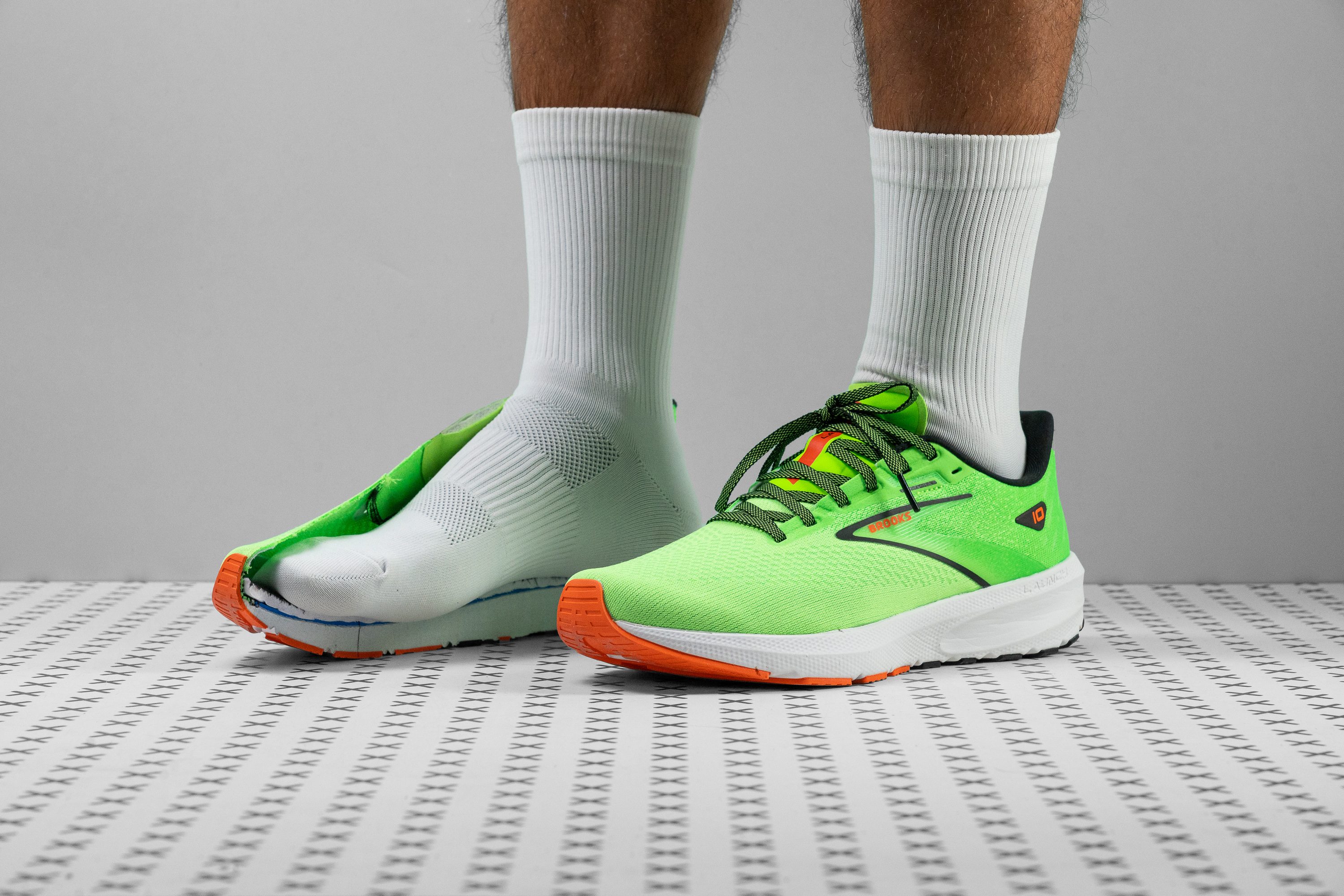Our verdict
- Top pick in best Brooks walking shoes (2023)
Pros
- Amazing value
- Incredibly light
- Comfortable upper
- Durable outsole that stands the test of time
- Works well for both easy and fast-paced runs
- Balanced midsole
- Balanced midsole
- Great grip on most surfaces
Cons
- Breathability needs improvement
- Foam becomes too stiff in cold winter temperatures
- Not enough energy return
Audience verdict
Comparison
The most similar running shoes compared
+ + Add a shoe | |||||
|---|---|---|---|---|---|
| Audience score | 87 Great! | 77 Decent! | 76 Decent! | 83 Good! | |
| Price | £110 | £65 | £100 | £110 | |
| Pace | Daily runningTempo | Daily running | Daily running | Daily runningTempo | |
| Shock absorption | Moderate | Moderate | Moderate | Moderate | |
| Energy return | Low | Low | Low | Moderate | |
| Traction | Moderate | Moderate | Moderate | High | |
| Arch support | Neutral | Neutral | Neutral | Neutral | |
| Weight lab Weight brand | 8.1 oz / 230g 8.2 oz / 232g | 9.3 oz / 265g 9.4 oz / 267g | 9.1 oz / 257g 9 oz / 255g | 8.4 oz / 237g 7.7 oz / 218g | |
| Lightweight | ✓ | ✗ | ✗ | ✓ | |
| Drop lab Drop brand | 10.0 mm 10.0 mm | 10.1 mm 10.0 mm | 11.9 mm 12.0 mm | 9.5 mm 8.0 mm | |
| Strike pattern | HeelMid/forefoot | Heel | Heel | HeelMid/forefoot | |
| Size | True to size | Slightly small | True to size | True to size | |
| Midsole softness | Soft | Balanced | Balanced | Balanced | |
| Difference in midsole softness in cold | Normal | Small | Small | Small | |
| Toebox durability | Decent | Decent | Bad | Decent | |
| Heel padding durability | Good | Good | Good | Bad | |
| Outsole durability | Good | Good | Good | Good | |
| Breathability | Moderate | Moderate | Moderate | Moderate | |
| Width / fit | Medium | Medium | Medium | Medium | |
| Toebox width | Medium | Medium | Medium | Medium | |
| Stiffness | Moderate | Moderate | Moderate | Moderate | |
| Torsional rigidity | Moderate | Moderate | Moderate | Stiff | |
| Heel counter stiffness | Moderate | Moderate | Stiff | Stiff | |
| Heel lab Heel brand | 33.8 mm 34.0 mm | 32.2 mm 32.0 mm | 34.1 mm 34.0 mm | 33.5 mm 35.5 mm | |
| Forefoot lab Forefoot brand | 23.8 mm 24.0 mm | 22.1 mm 22.0 mm | 22.2 mm 22.0 mm | 24.0 mm 27.5 mm | |
| Widths available | Normal | NarrowNormalWideX-Wide | NormalWide | NormalWide | |
| Orthotic friendly | ✓ | ✓ | ✓ | ✓ | |
| Season | All seasons | All seasons | All seasons | All seasons | |
| Removable insole | ✓ | ✓ | ✓ | ✓ | |
| Ranking | #342 Bottom 48% | #335 Bottom 9% | #344 Bottom 7% | #256 Bottom 31% | |
| Popularity | #292 Top 45% | #60 Top 17% | #142 Top 39% | #100 Top 27% |
Who should buy
We are of the opinion that this Brooks daily trainer is a great choice for:
- Those seeking a value-oriented running shoe that can handle almost any pace and distance
- Beginners who want a versatile road running shoe without breaking the bank
- Runners looking for a lightweight workhorse to add to their collection.
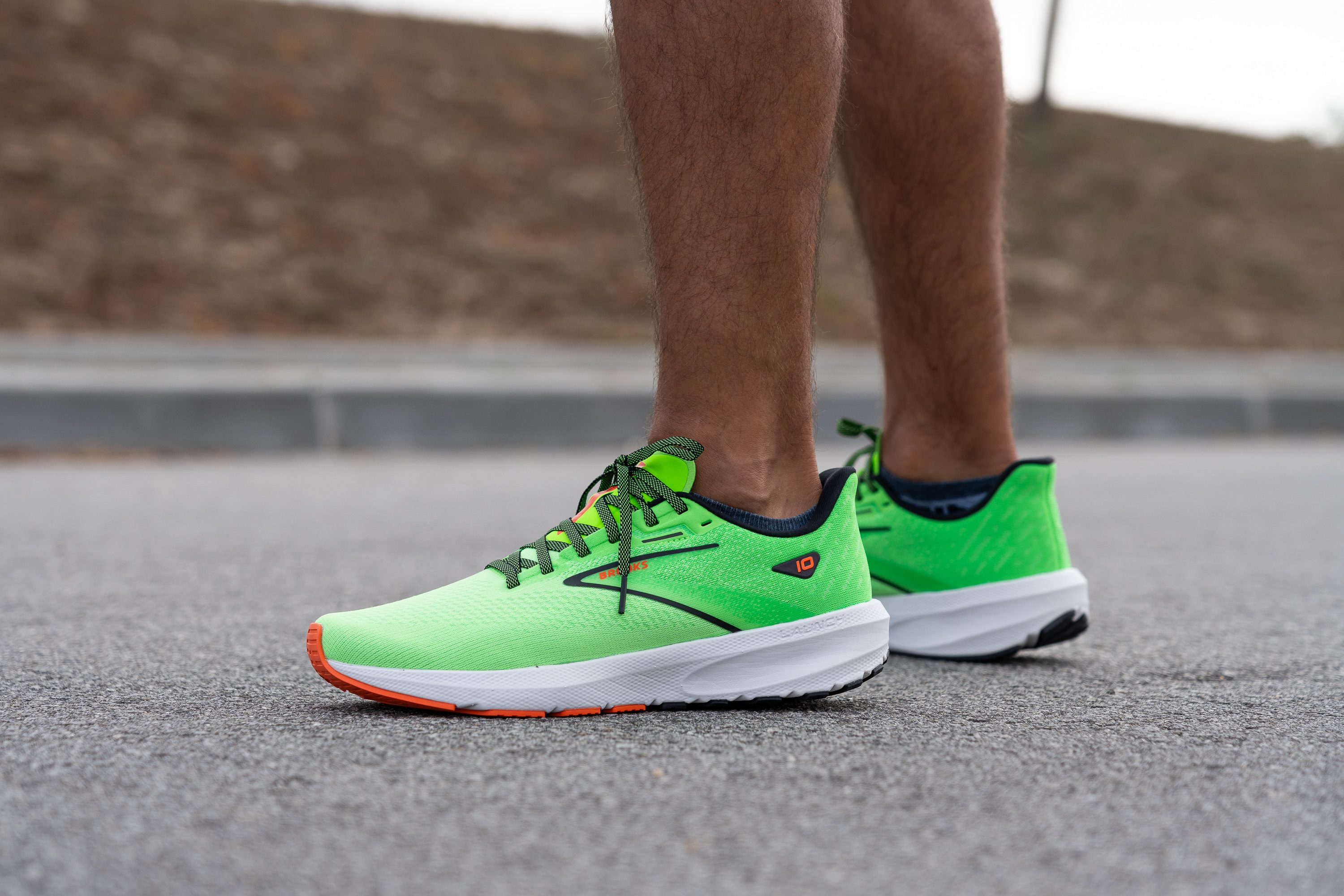
Who should NOT buy
We're not going to lie—this Brooks shoe is so good that it's hard to find a runner who shouldn't get them. But there are two potential situations where you may want to explore other alternatives.
If you like low-drop or even mid-drop shoes, this one is going to be too steep for you with its 10-mm heel-to-toe drop. You might want to check the Hoka Mach 5 instead.
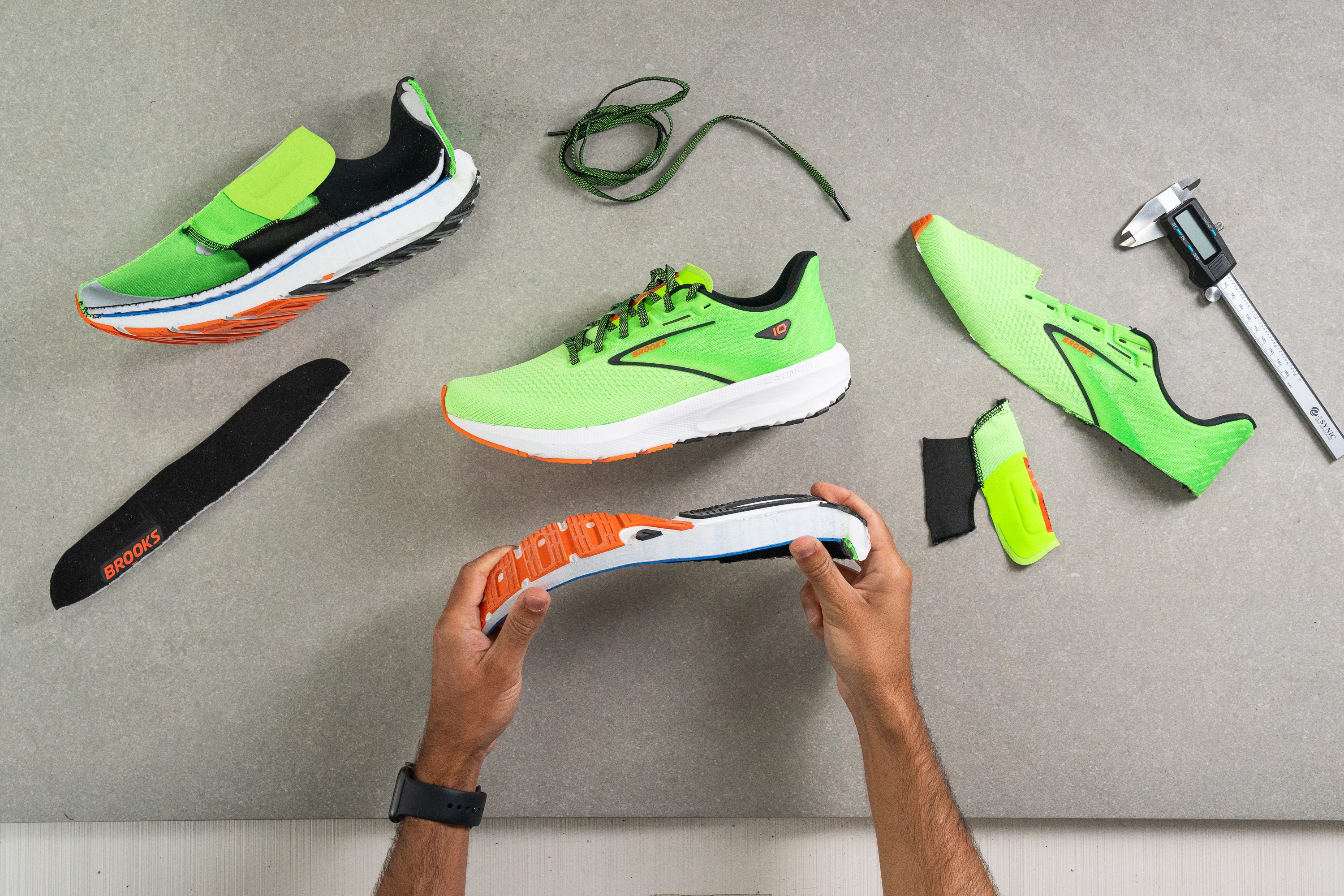
Also, if you live in a cold climate and you're not on a budget, there are better choices in the market. A versatile and light shoe with premium foam like the Saucony Endorphin Speed 3 is a wiser choice in this scenario.
Cushioning
Shock absorption
The Launch 10 offers adequate cushioning for most runs, with 125 SA in the heel and 97 SA in the forefoot. It’s nothing extraordinary, but keep in mind this shoe comes at a price well below most daily trainers.
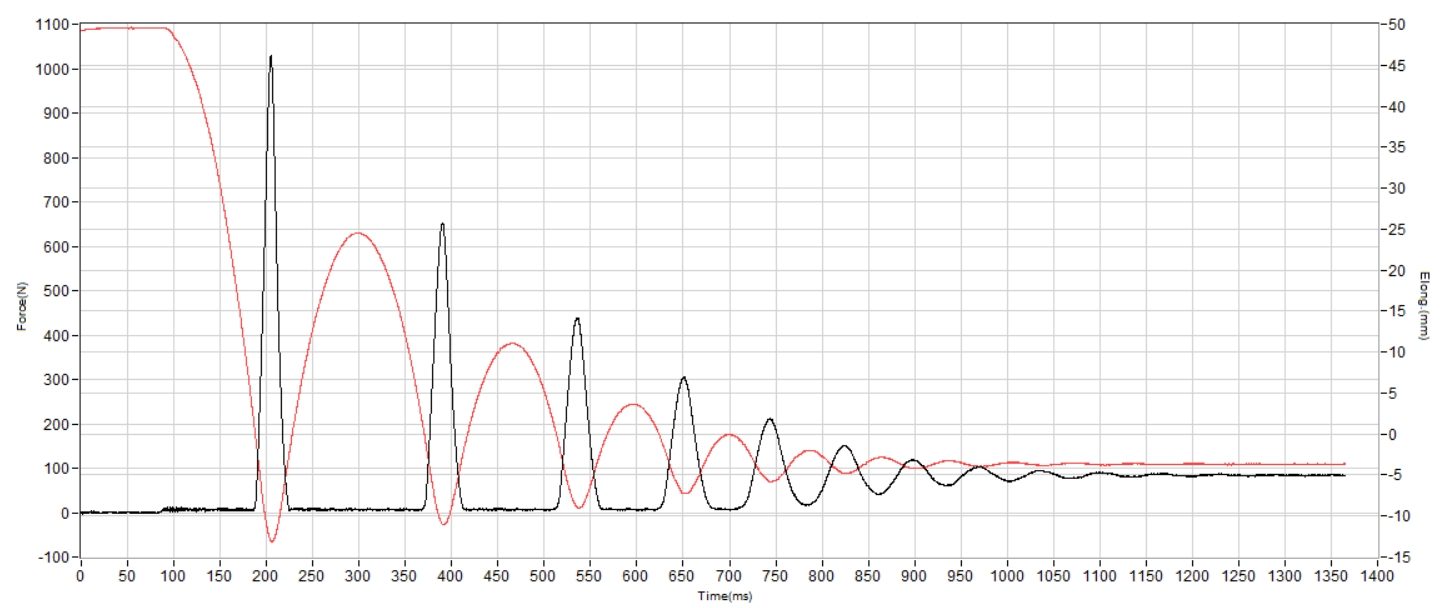
| Launch 10 | 125 SA |
| Average | 129 SA |
Energy return
Energy return matches the price point, as is often the case with running shoes. You pay less compared to models like the Pegasus, but that also means lower bounce with just 50.0% in the heel. The forefoot performs slightly better at 56.5%.
| Launch 10 | 50.0% |
| Average | 58.5% |
Heel stack
You might be thinking—if it's that light, it probably has a low stack height. But that's not the case at all!
We measured the stack height in the heel at 33.8 mm, and that's more than enough cushion even for heel strikers.
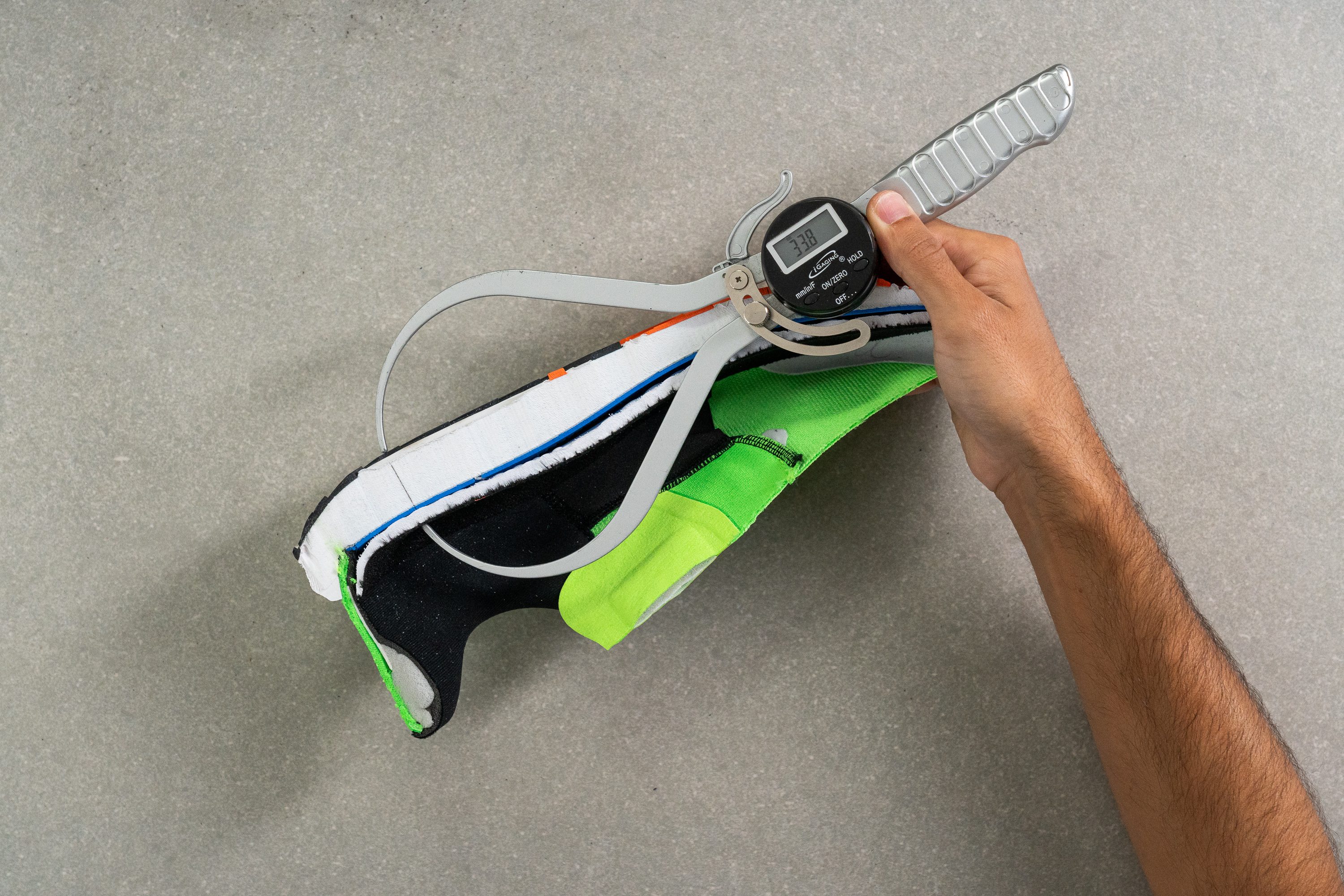
| Launch 10 | 33.8 mm |
| Average | 34.8 mm |
Forefoot stack
In the forefoot, we discovered a measurement that's right in the middle of the road: 23.8 mm. This makes the shoe suitable for both forefoot and midfoot strikers.
However, if you're plan to do long runs and you're a forefoot striker, you might consider a more cushioned option with a lower drop, like the ASICS Novablast 3.
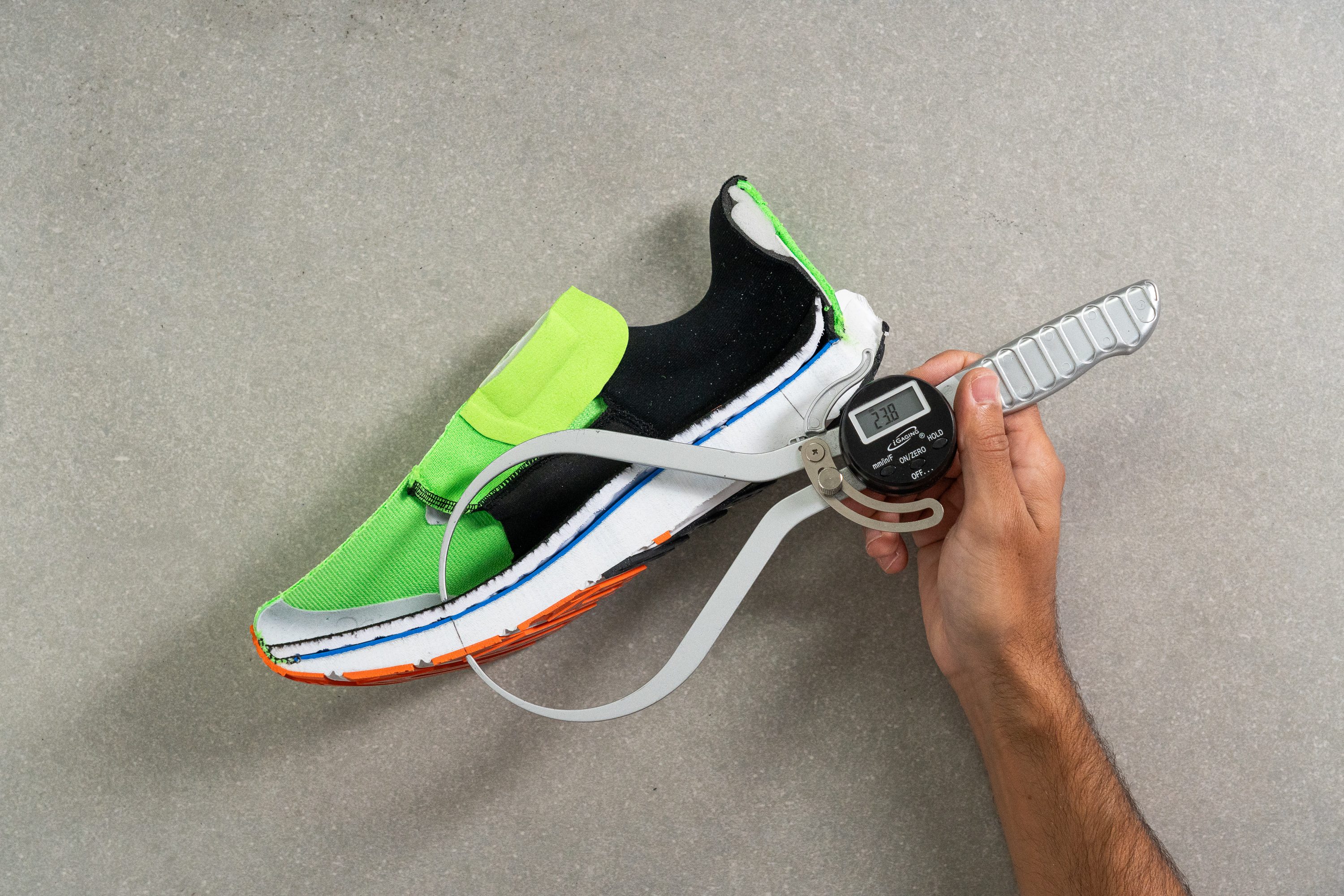
| Launch 10 | 23.8 mm |
| Average | 26.2 mm |
Drop
Brooks has made quite a name for itself in the running shoe world for crafting high drop shoes, and they've done it again. Oh, and this time, the American brand said the heel-to-toe drop would be 10 mm and we found exactly that same drop. Now, that's something you don't see every day!
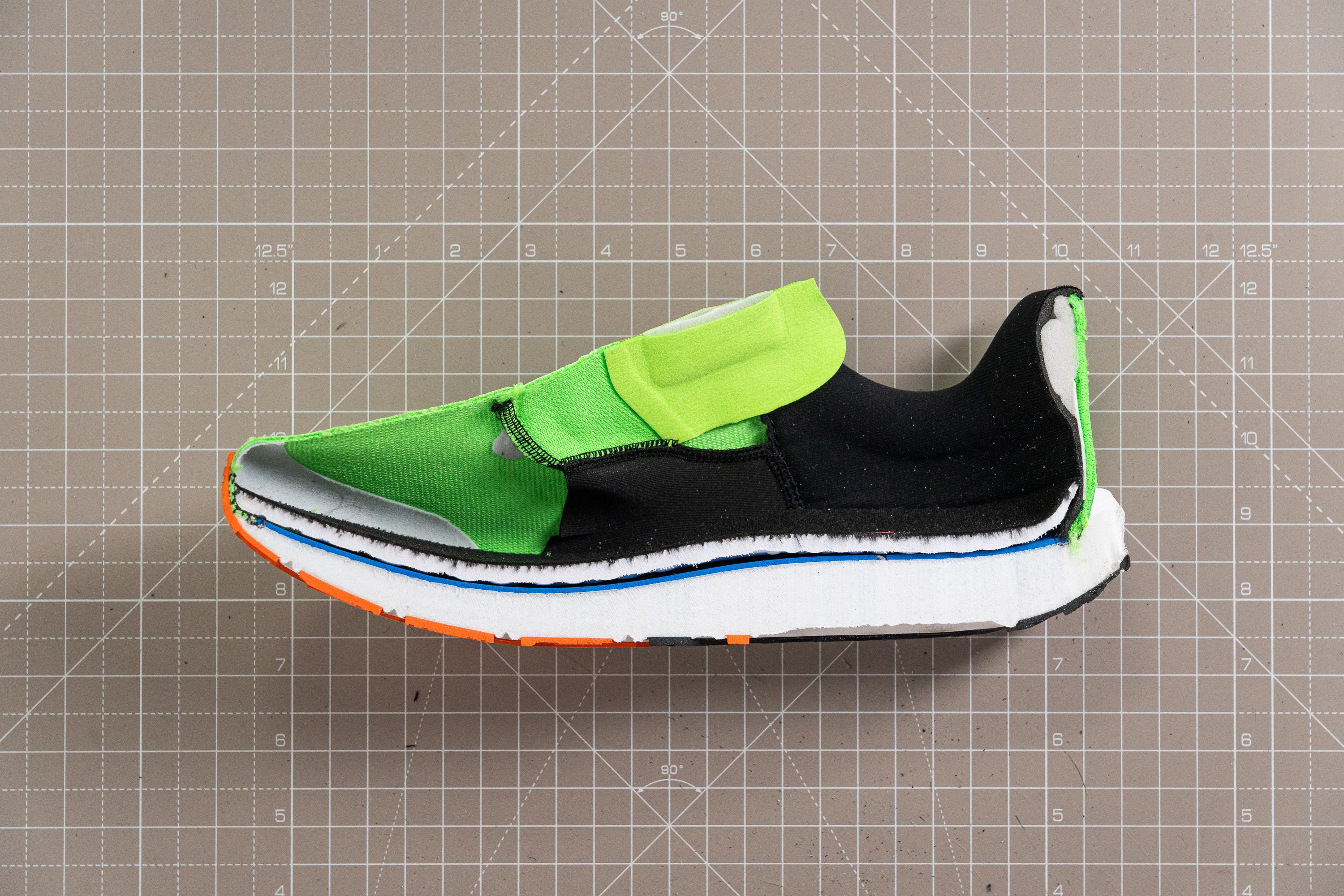
| Launch 10 | 10.0 mm |
| Average | 8.6 mm |
Midsole softness
When we shift our attention to the midsole, we discover that the DNA foam is moderately soft, registering at 19.8 HA in our durometer.
Even though this isn't the top-tier foam in Brooks' lineup, it does an impressive job of delivering a nice balance between softness and energy return.
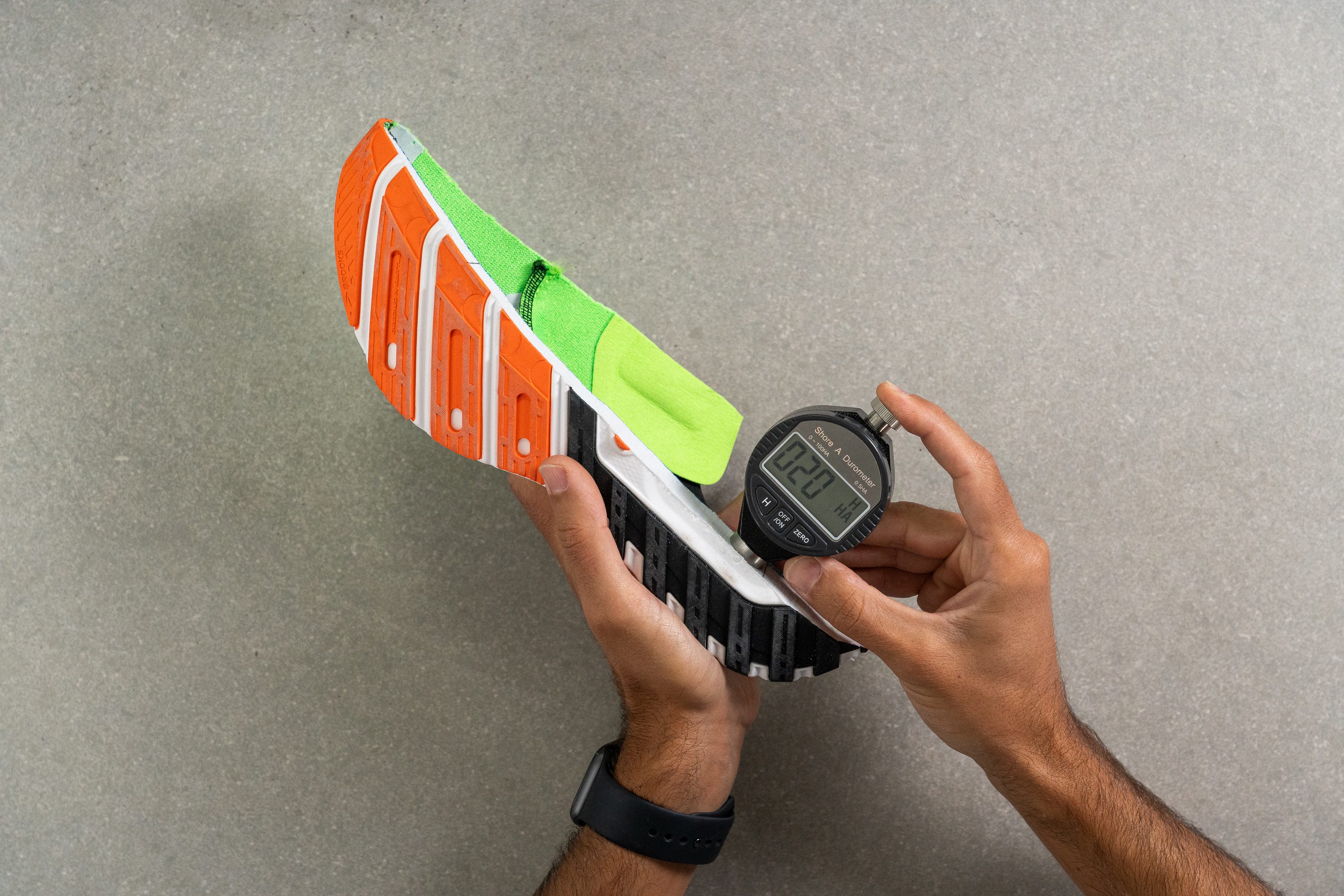
| Launch 10 | 19.8 HA |
| Average | 20.4 HA |
Size and fit
Size
Brooks Launch 10 fits true to size (297 votes).
Width / Fit
We meticulously crafted a gel mould of the Launch 10's interiors, capturing its precise dimensions to ensure accuracy. The shoe measured an impressive 97.5 mm at its widest point—slightly exceeding the width found in most Brooks models.
This added width also sets it apart from many other daily trainers, offering a roomier fit that prioritises comfort.
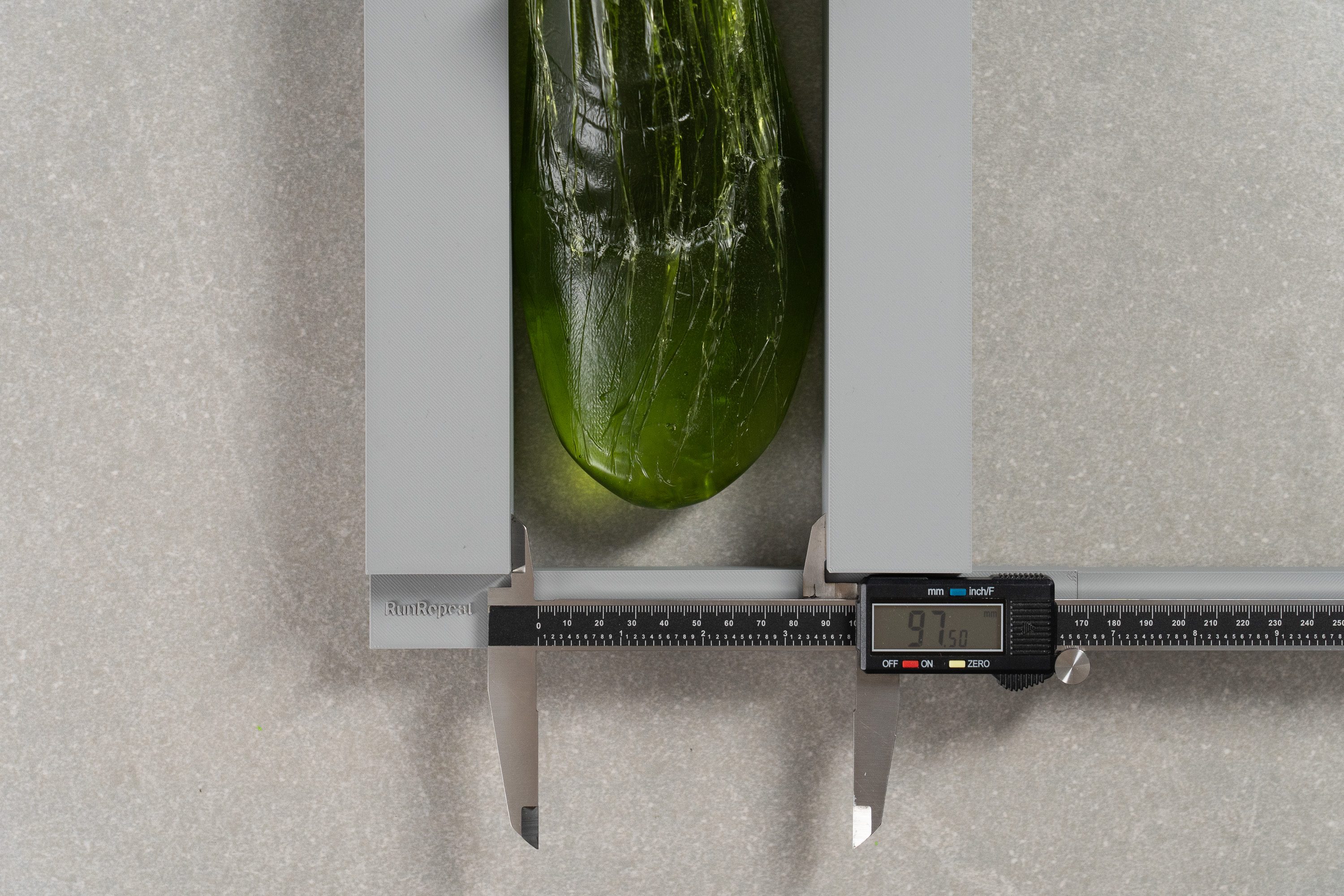
| Launch 10 | 97.5 mm |
| Average | 95.1 mm |
Toebox width
Around the big toe area, the fit is average, as we've measured that part at 73.6 mm, yet it's nothing you should worry about.
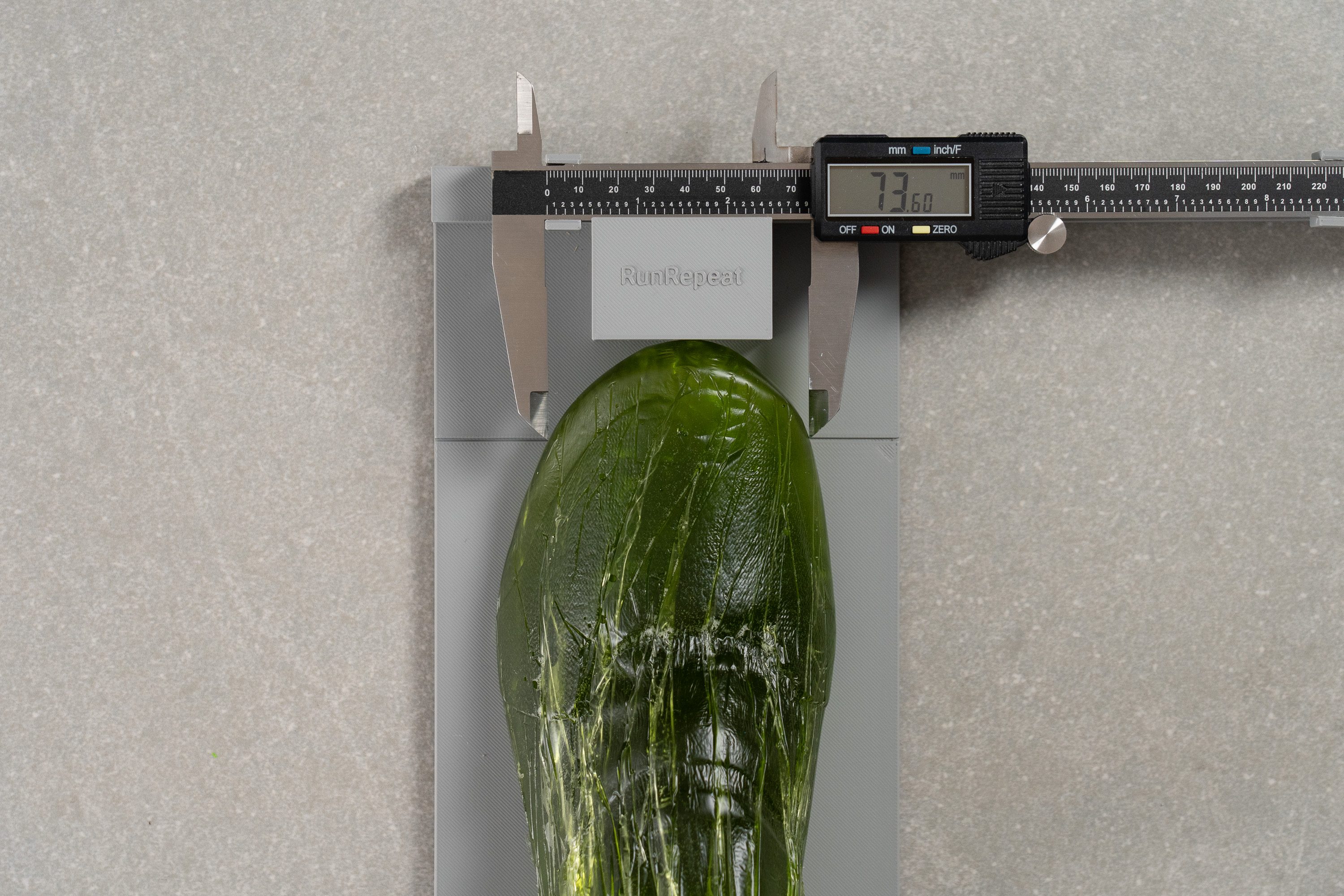
| Launch 10 | 73.6 mm |
| Average | 73.3 mm |
Toebox height
With each measurement, the shoe appears to offer progressively less space. The toebox height is particularly restricted at just 25.2 mm. For those seeking more vertical room, consider the Adidas Supernova Rise as an alternative.
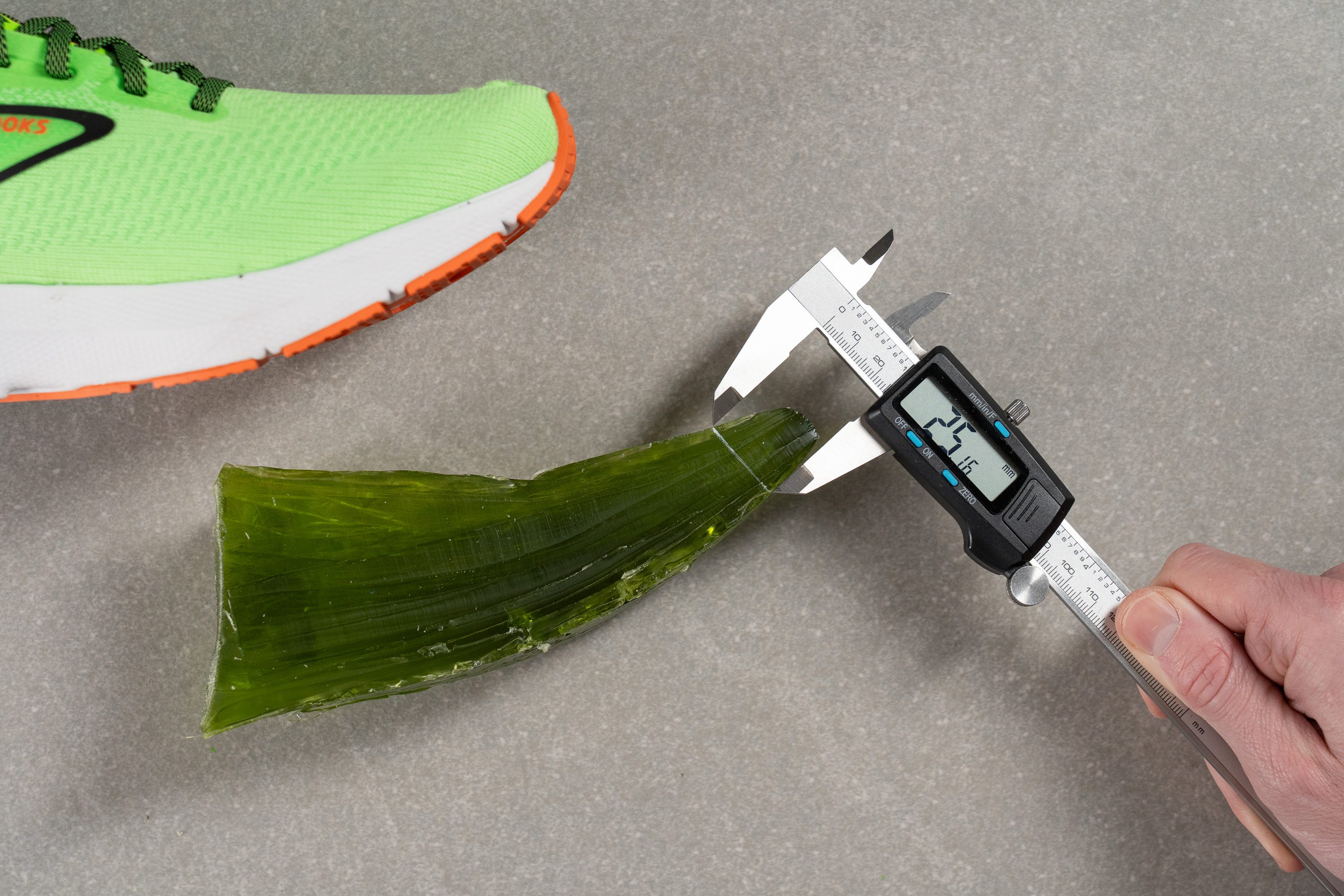
| Launch 10 | 25.2 mm |
| Average | 27.1 mm |
Traction / Grip
Traction test
We recommend sticking to dry roads and pavements in the Brooks Launch 10 because its outsole bite is just not strong enough for wet concrete.
Recording a below-average friction score of 0.34, our SATRA TM144 grip test further confirmed our on foot experience.
| Launch 10 | 0.34 |
| Average | 0.48 |
Outsole design
Brooks incorporated a few more cutouts than usual in an effort to reduce the weight of the shoe, aiming for a lighter and more agile performance.
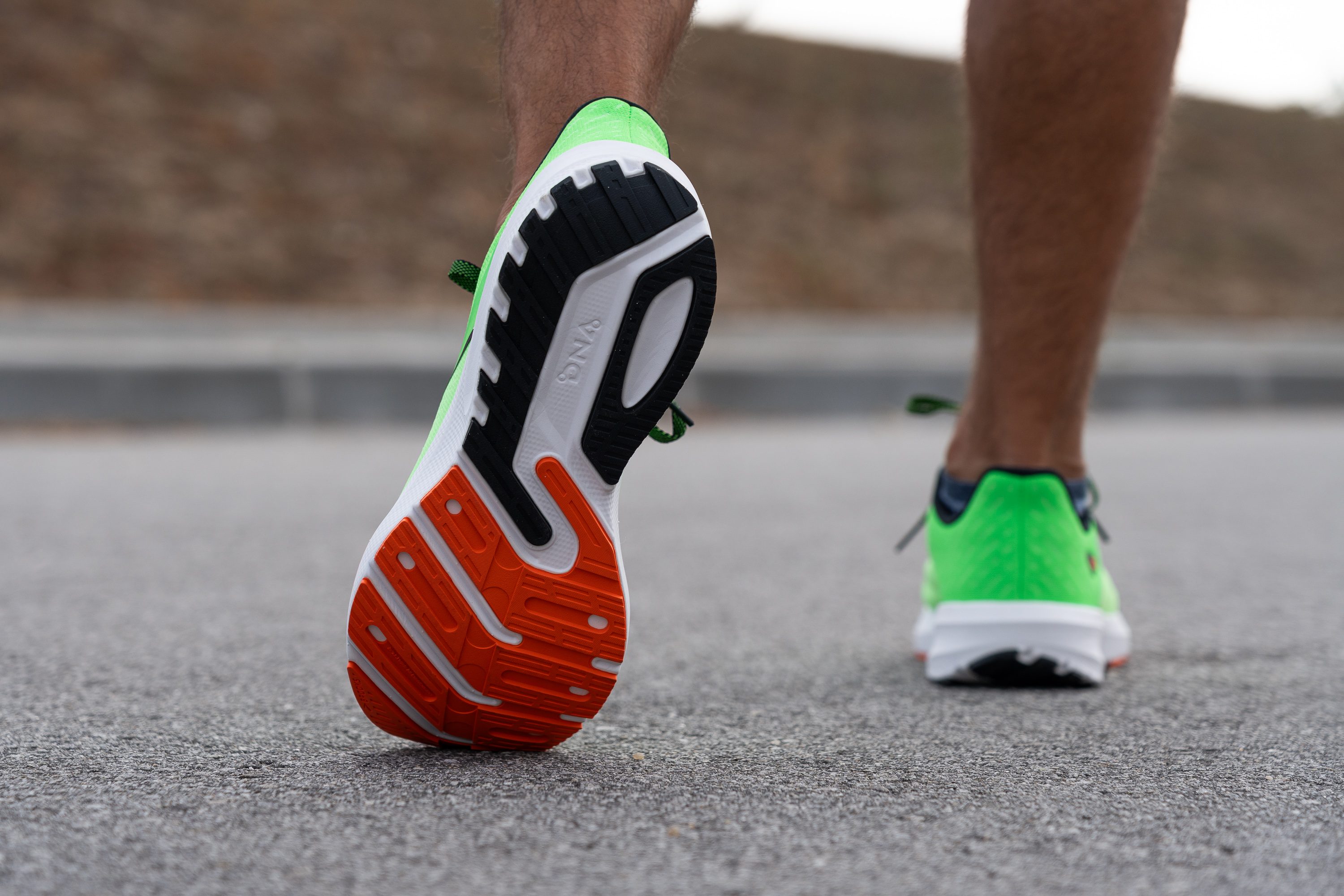
Flexibility / Stiffness
A daily trainer must embody the essence of comfort, and a significant part of that comfort comes from the shoe's longitudinal flexibility. Fortunately, we only needed to apply a mere 13.3N of force with our machine to move it to the desired angle.
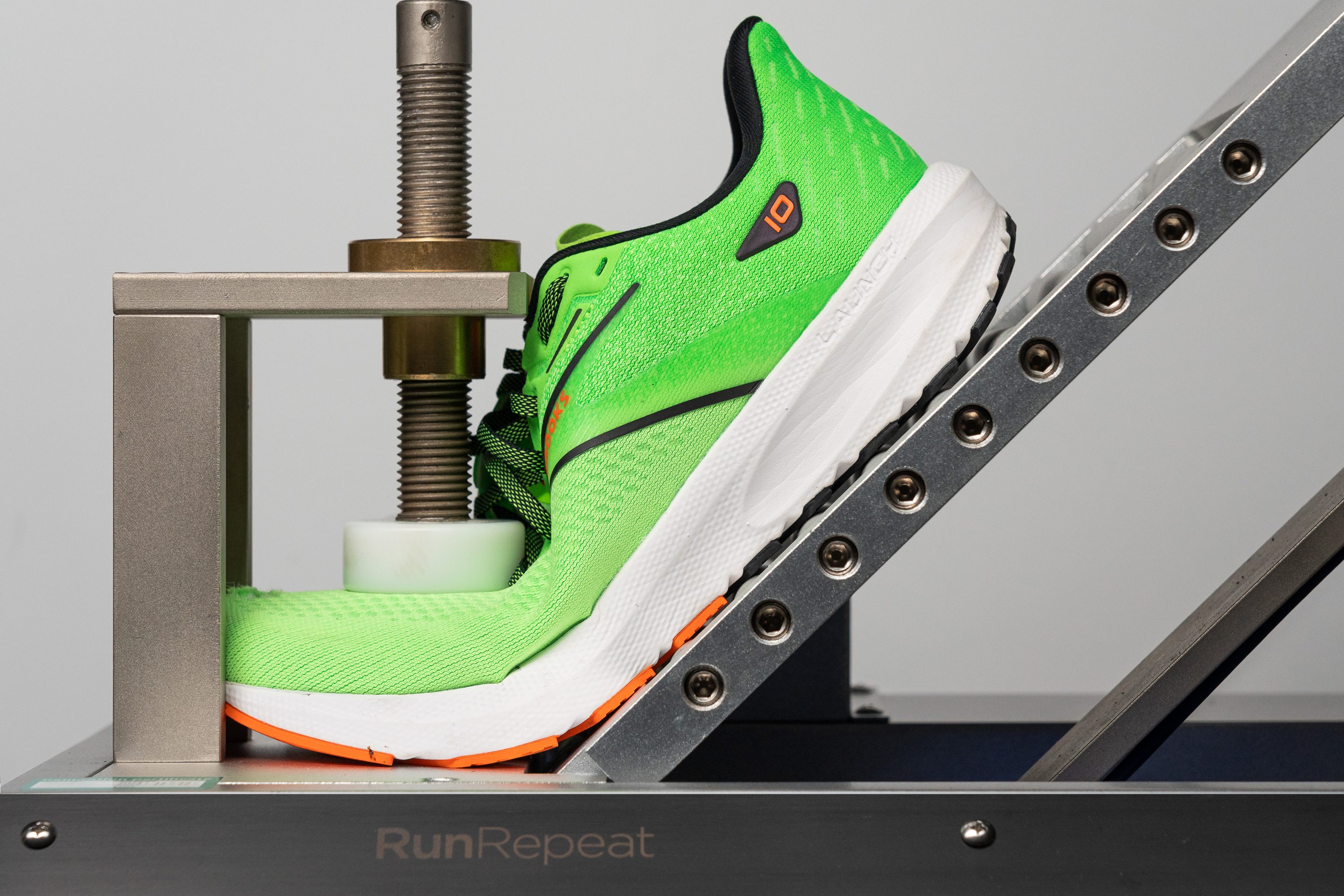
| Launch 10 | 13.3N |
| Average | 15.3N |
Stiffness in cold (%)
However, things changed after we exposed the shoe to freezing temperatures for 20 minutes. We then needed to exert 30.7N of force to move it to the same point. This is almost double the force required before, showing a significant change in the shoe's flexibility.
Indeed, there's a 68.6% increase in rigidity, and it's pretty disappointing, though we can't say we're surprised. EVA foams like this one tend to perform poorly in cold weather, becoming excessively rigid.
| Launch 10 | 69% |
| Average | 33% |
Weight
Weighing in at a feather-light 8.10 oz (230g) for a US size 9, this is one of the lightest daily trainers on the market.
To give you a better idea of how light that really is, consider this: the popular Nike Pegasus 40 is 20% heavier. That's quite a difference when you're on the move!
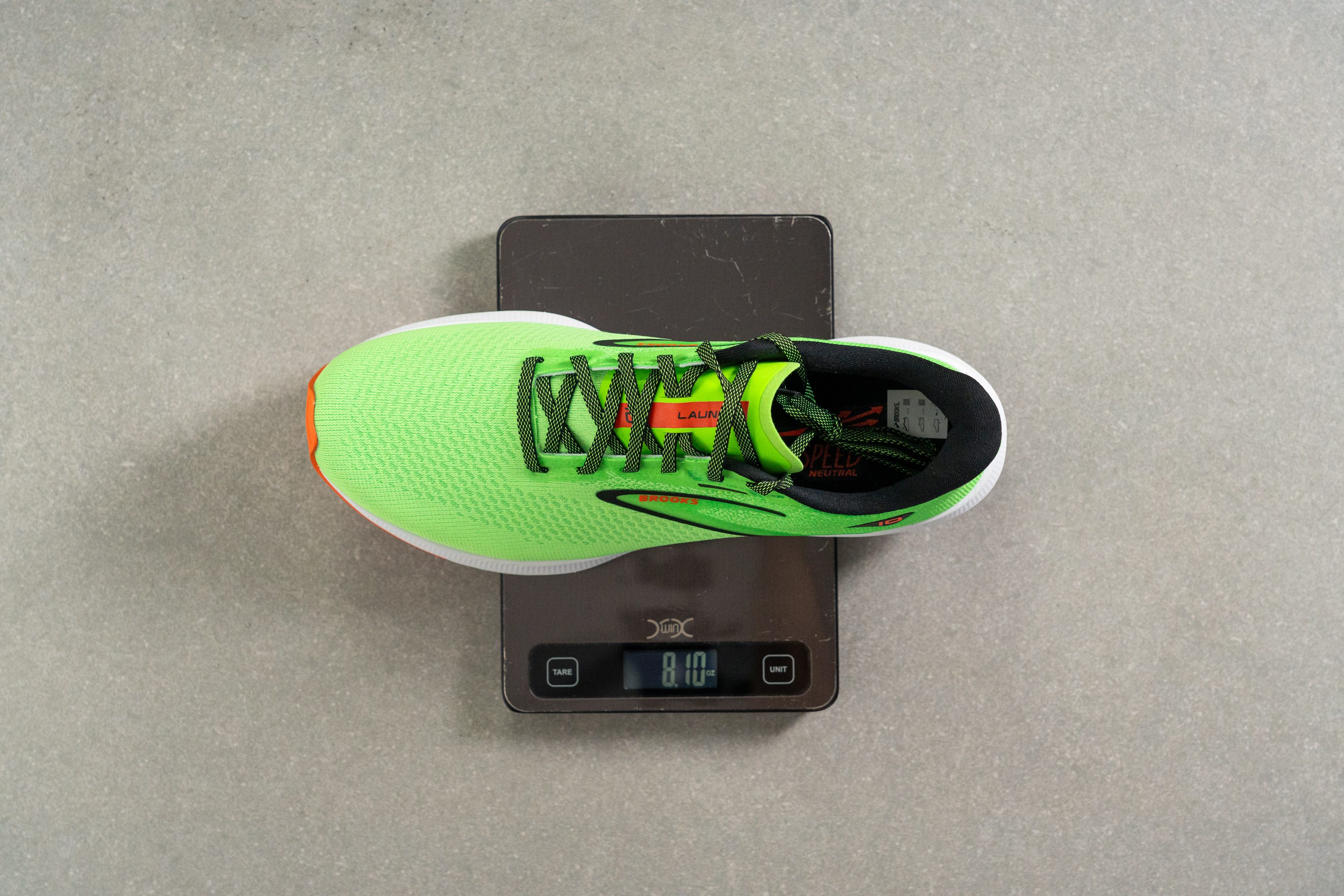
| Launch 10 | 8.1 oz (230g) |
| Average | 9.3 oz (264g) |
Breathability
The breathability in the Brooks Launch 10 isn't the worst or the best we've ever measured. It just sits in the middle, and we've rated it accordingly at 3/5 in our remarkable test using a smoke-pumping machine.
The result was surprising because the shoe appeared to have breathability holes integrated into the upper, or so we thought. Our light test revealed them, although it's evident they're not as effective as those in the Brooks Adrenaline GTS 23.
But nothing shows the truth like our microscope, where we can examine the upper really closely.
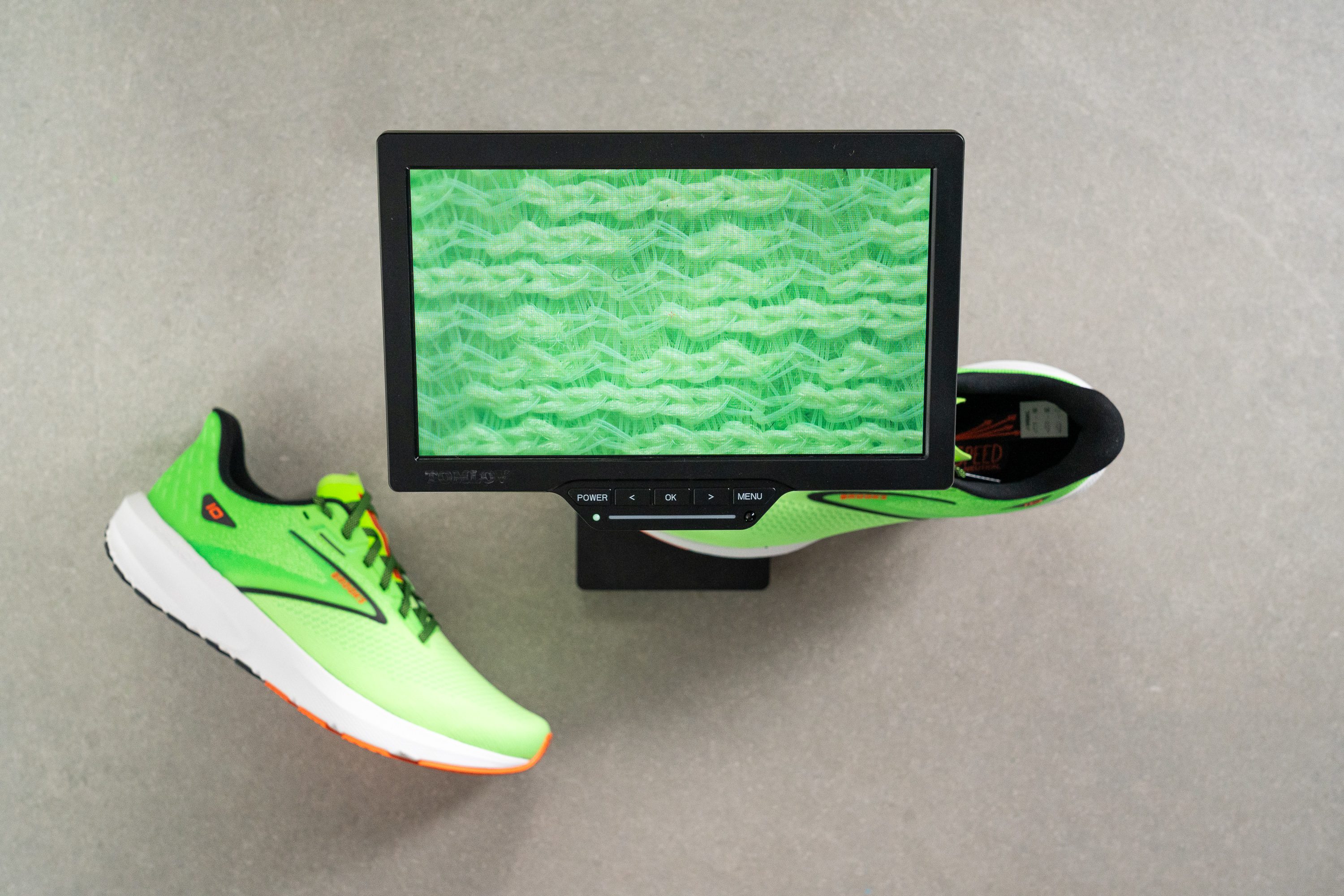
Here we observed that Brooks opted for an engineered mesh that, when seen up close, is thicker than it seemed. There's not much room for heat and humidity to escape.
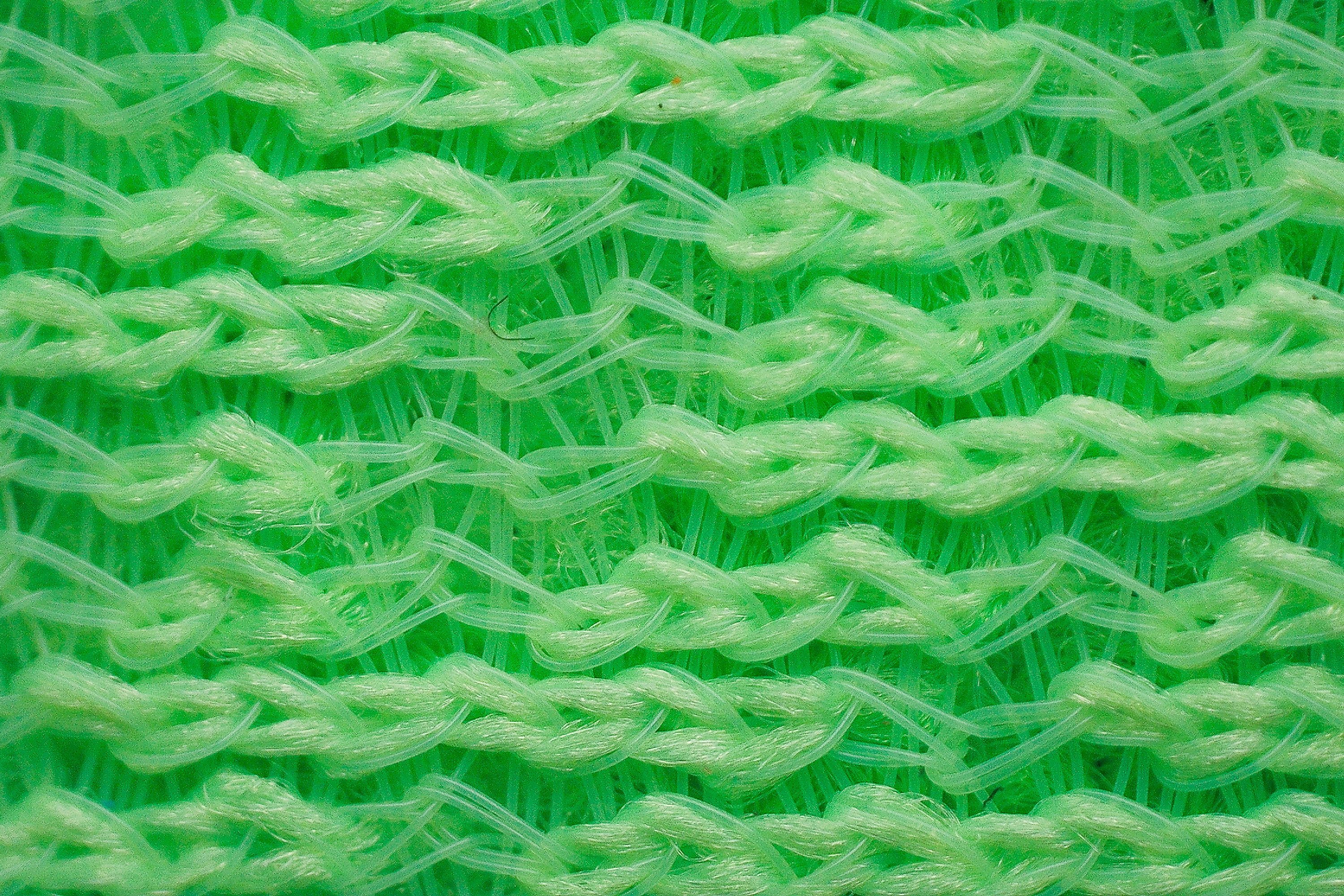
| Launch 10 | 3 |
| Average | 3.7 |
Stability
Lateral stability test
Even though the basic Launch 10 doesn't carry the famous "GTS" label that signals stability in Brooks shoes, it still does a great job. We've found that it never feels unstable, making it a solid choice for neutral runners who crave stability without an intrusive approach.
Torsional rigidity
When we gently twisted the shoe for the torsional rigidity test, we settled on a score of 3 out of 5.
This result perfectly aligns with our feelings about the shoe's decent stability. Even though it's not specifically designed for this feature and doesn't carry the Brooks GuideRails, the shoe shows no signs of wobbling at all.
| Launch 10 | 3 |
| Average | 3.5 |
Heel counter stiffness
This is neither the hyper-stiff heel counter typically found in stability shoes nor the flexible one seen in most daily trainers. Instead, it finds a comfortable middle ground.
| Launch 10 | 3 |
| Average | 2.9 |
Midsole width - forefoot
To create a lightweight shoe, it's essential not to make the design overly wide. Brooks understood this principle well, and that's why we measured a forefoot width of 113.8 mm, a figure that is right in line with the average.
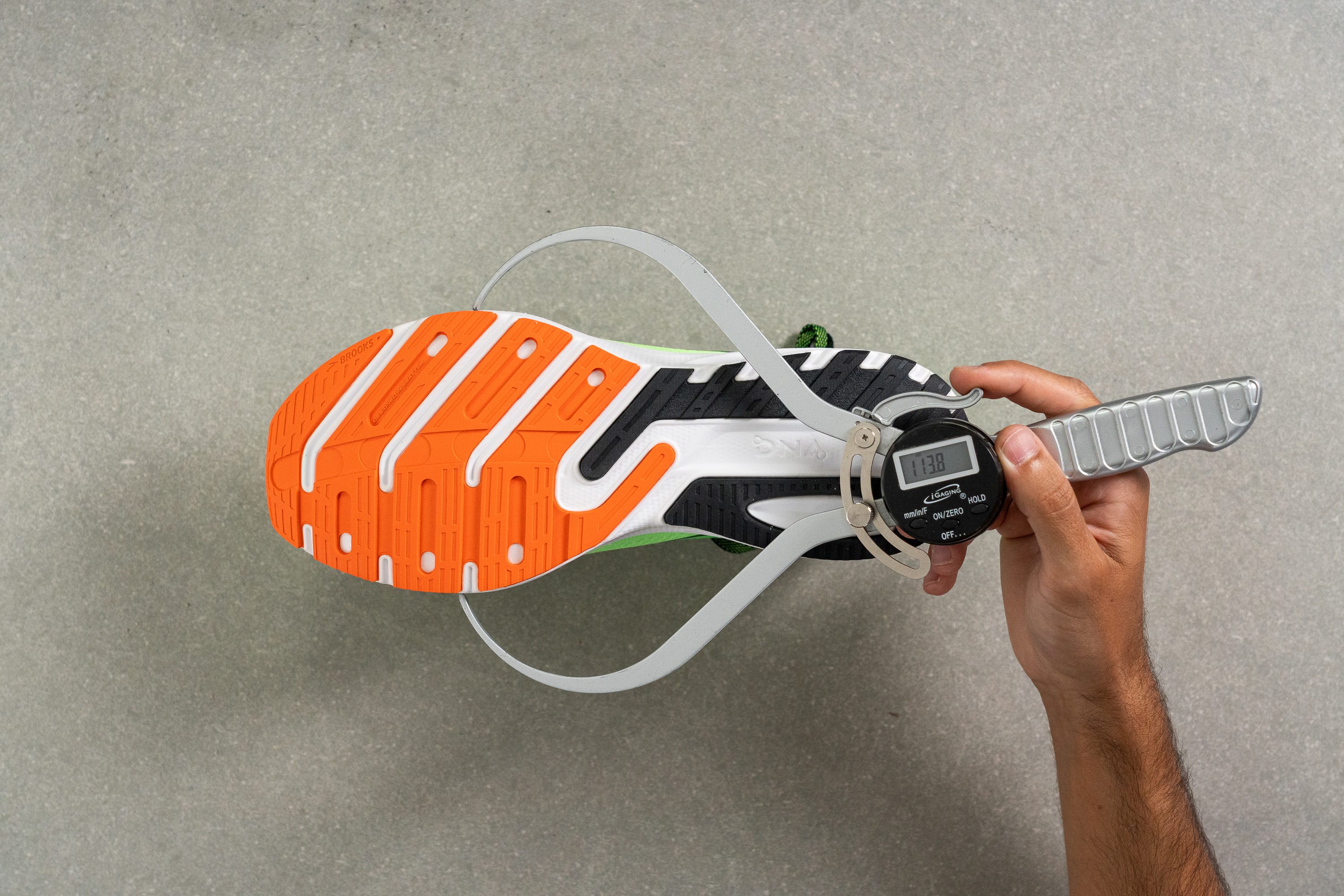
| Launch 10 | 113.8 mm |
| Average | 114.4 mm |
Midsole width - heel
In the heel, Brooks took a really aggressive approach, narrowing it down to 83.2 mm.
While this design likely won't be a problem for most runners, heel strikers who have overpronation might find this shoe a little bit unstable and may want to try a wider shoe like the Brooks Glycerin GTS 20.
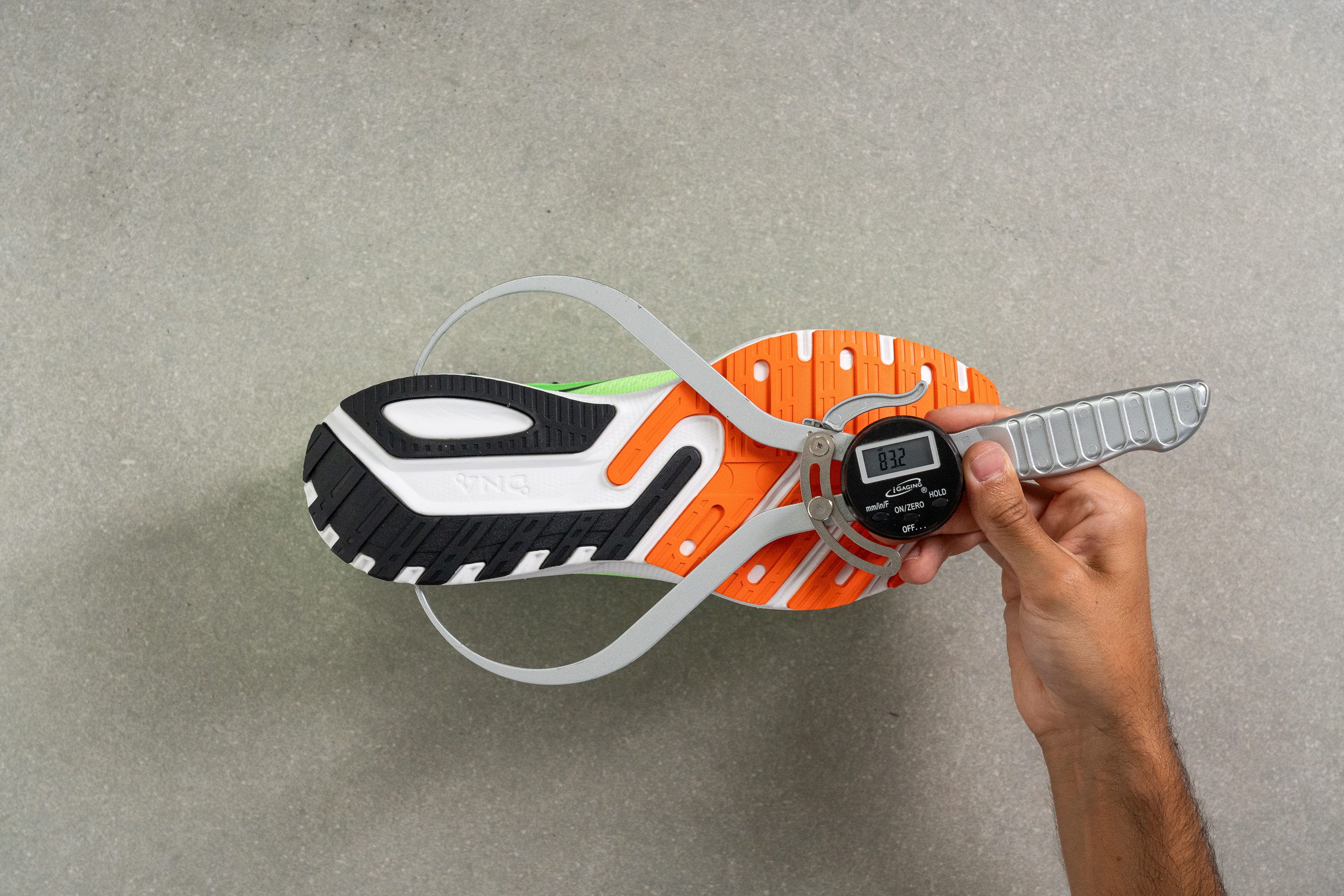
| Launch 10 | 83.2 mm |
| Average | 90.7 mm |
Durability
Toebox durability
A similar performance of the Brooks Launch 10 extends from breathability to durability. We put this shoe through our challenging Dremel test, where we apply the same force for the same time to every shoe.
While a rating of 2/5 may initially seem like a low result, it's actually a good score in this demanding test. Impressively, the affordable Launch 10 outperforms most shoes on the market!
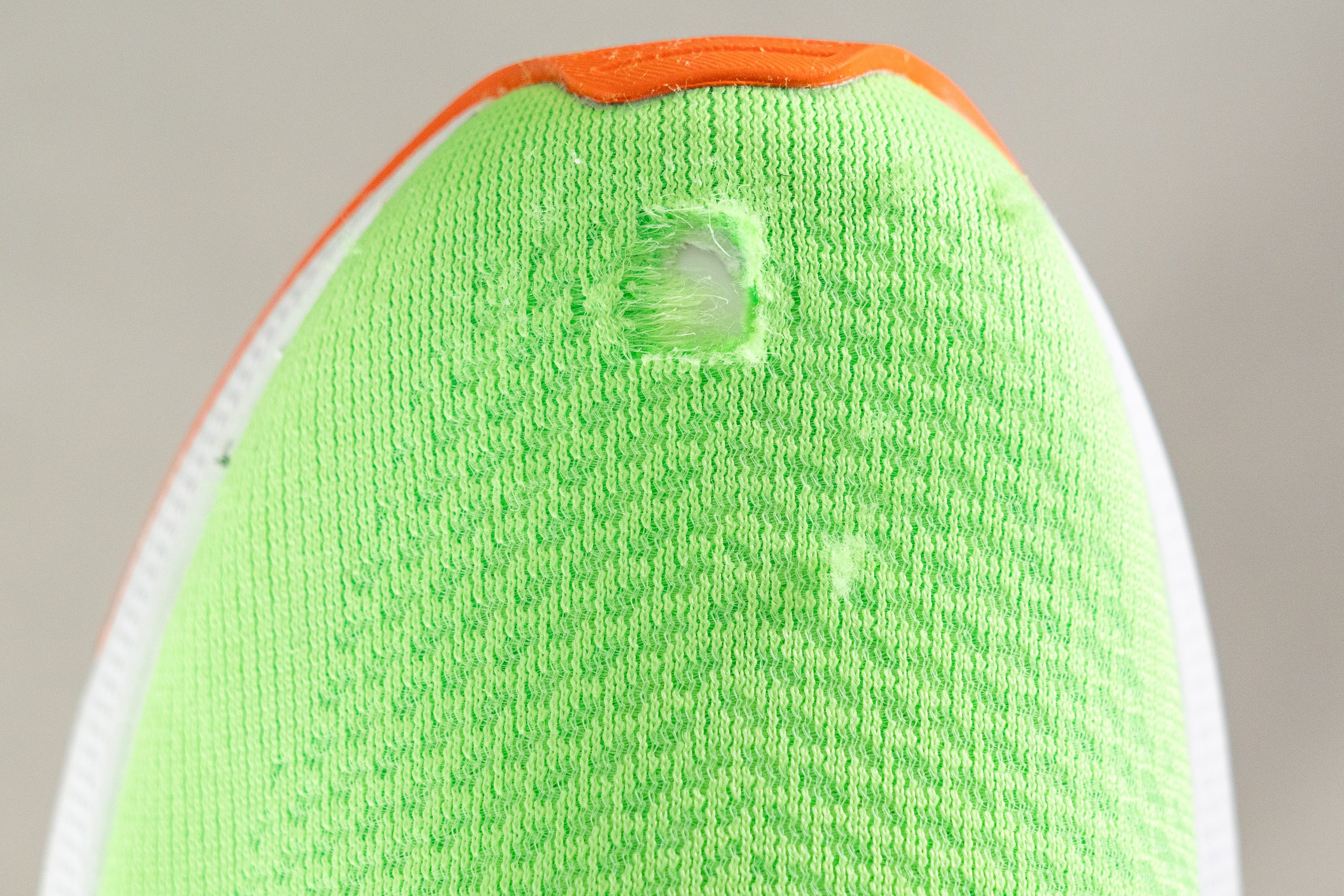
| Launch 10 | 2 |
| Average | 2.6 |
Heel padding durability
However, it's in the heel where the Launch 10 truly shines. When we switched on the Dremel again, the heel remained undaunted, displaying an impressive resilience.
The comparison with the Saucony Guide 16 became almost comical, highlighting the superior strength and robust nature of the Launch 10's heel.
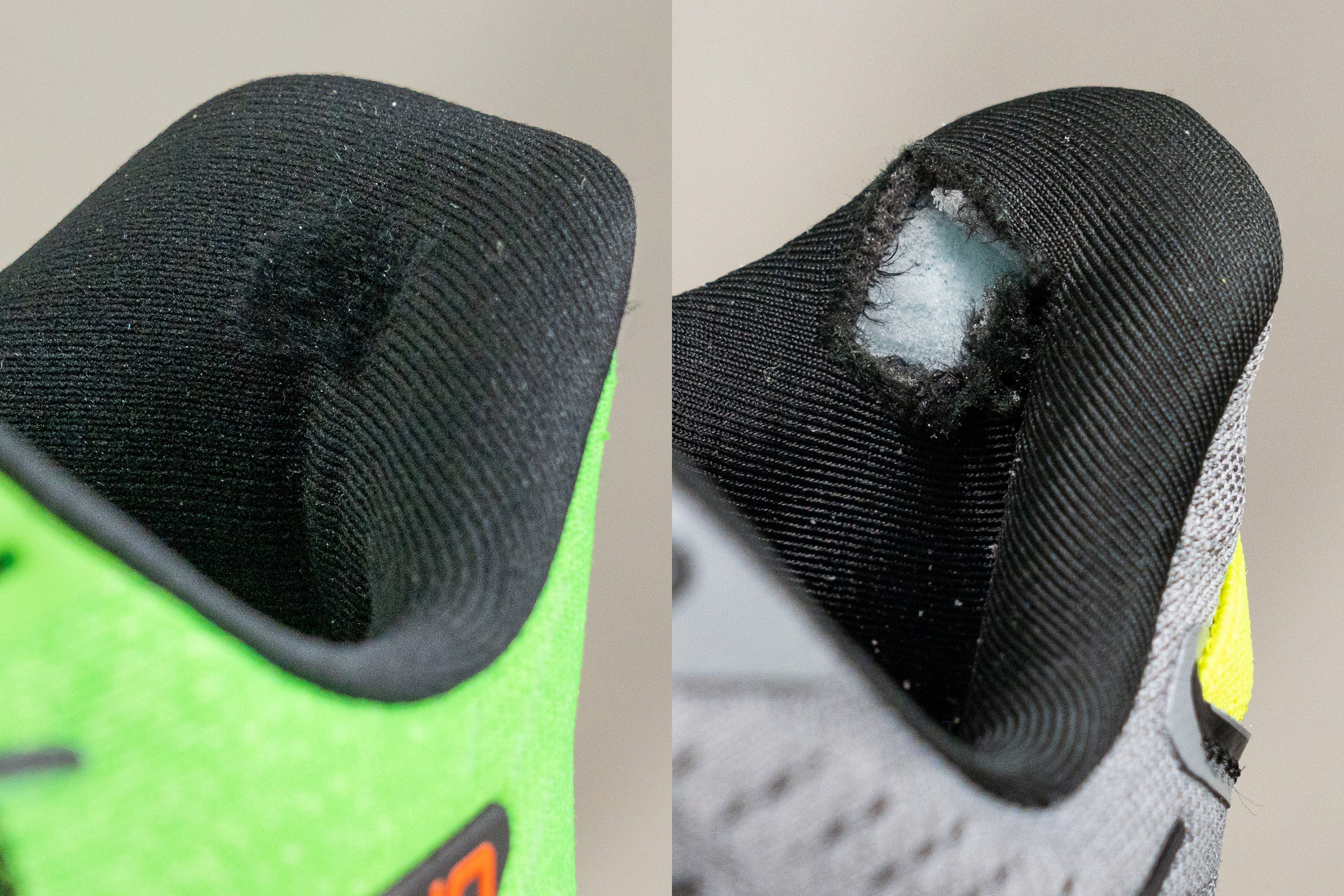
| Launch 10 | 5 |
| Average | 3.4 |
Outsole hardness
Moving to the outsole, we discovered an average compound with a hardness of 81.4 HC.

This clearly shows us that Brooks opted for a classic approach here, trying to achieve a balanced mix of durability and grip.
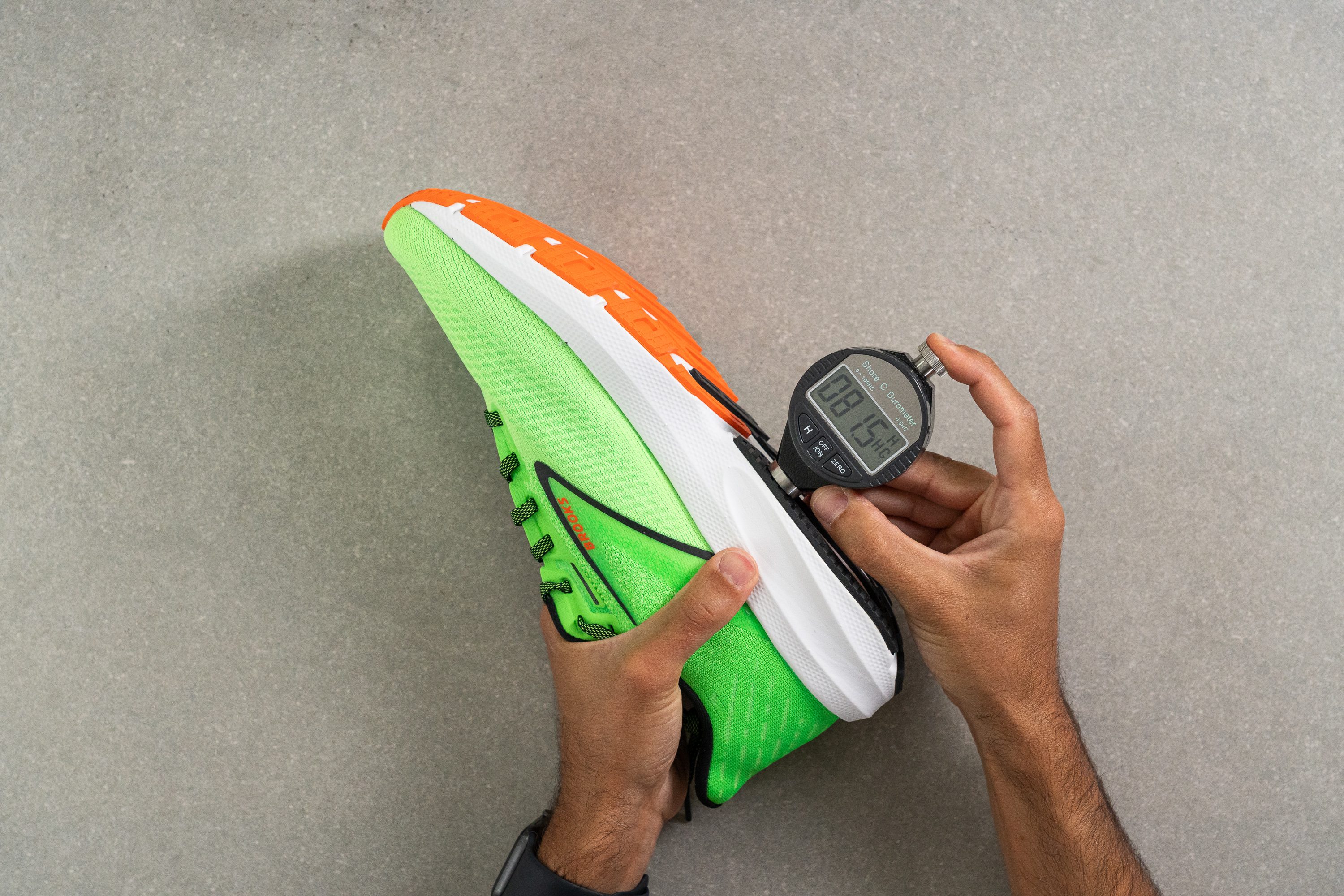
| Launch 10 | 81.4 HC |
| Average | 79.2 HC |
Outsole durability
But is it durable? We used the Dremel for its final appearance in this review and discovered that it performed quite well.
After 20 seconds, the tool was only able to make a 0.64-mm indentation in the outsole. This result surpasses the performance of the average shoe, showcasing its impressive durability.
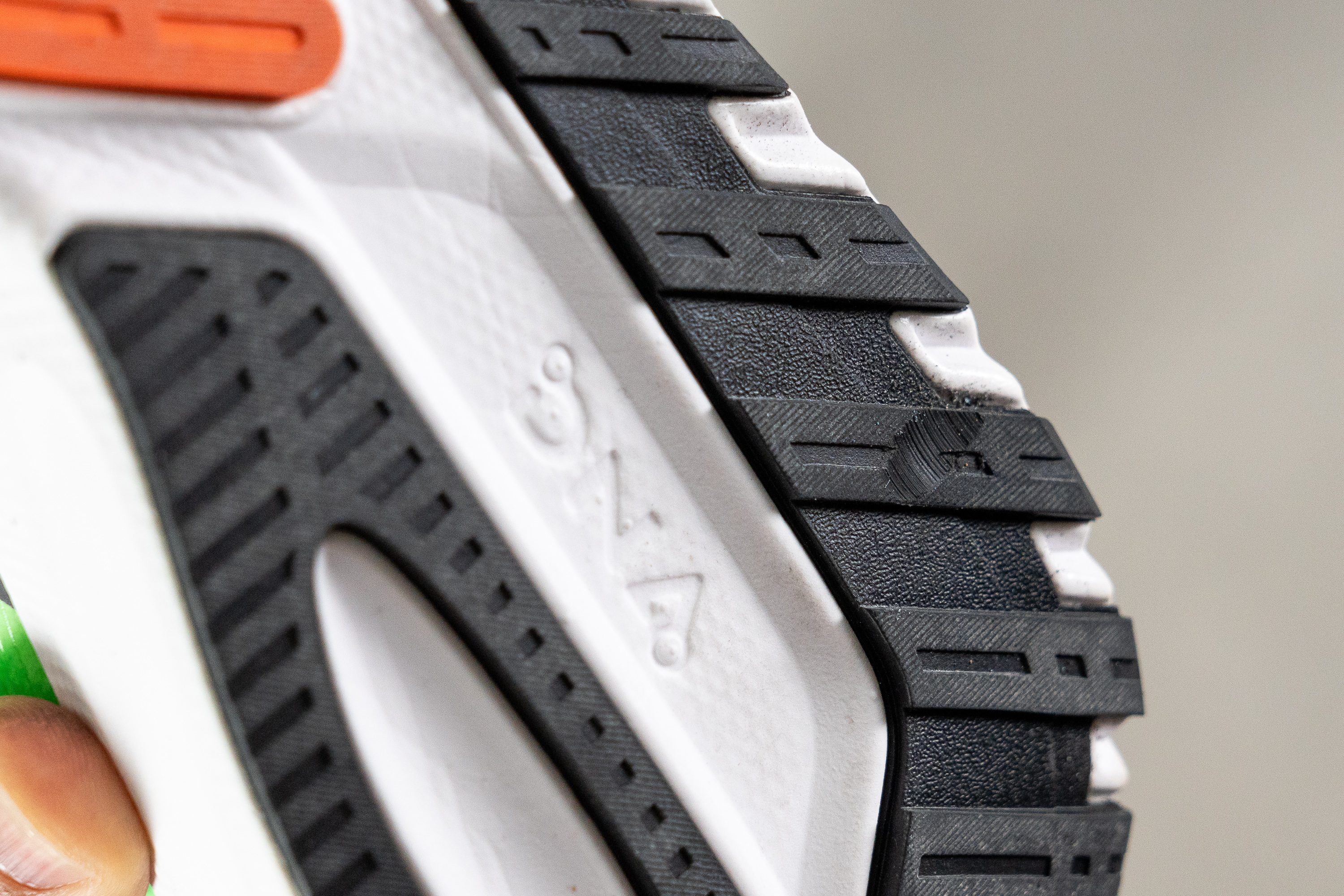
| Launch 10 | 0.6 mm |
| Average | 1.1 mm |
Outsole thickness
Brooks keeps playing it safe with the outsole, and we can't blame them! We measured the thickness at a solid 3.4 mm, which is pretty average and seems enough to last the entire lifespan of the midsole.
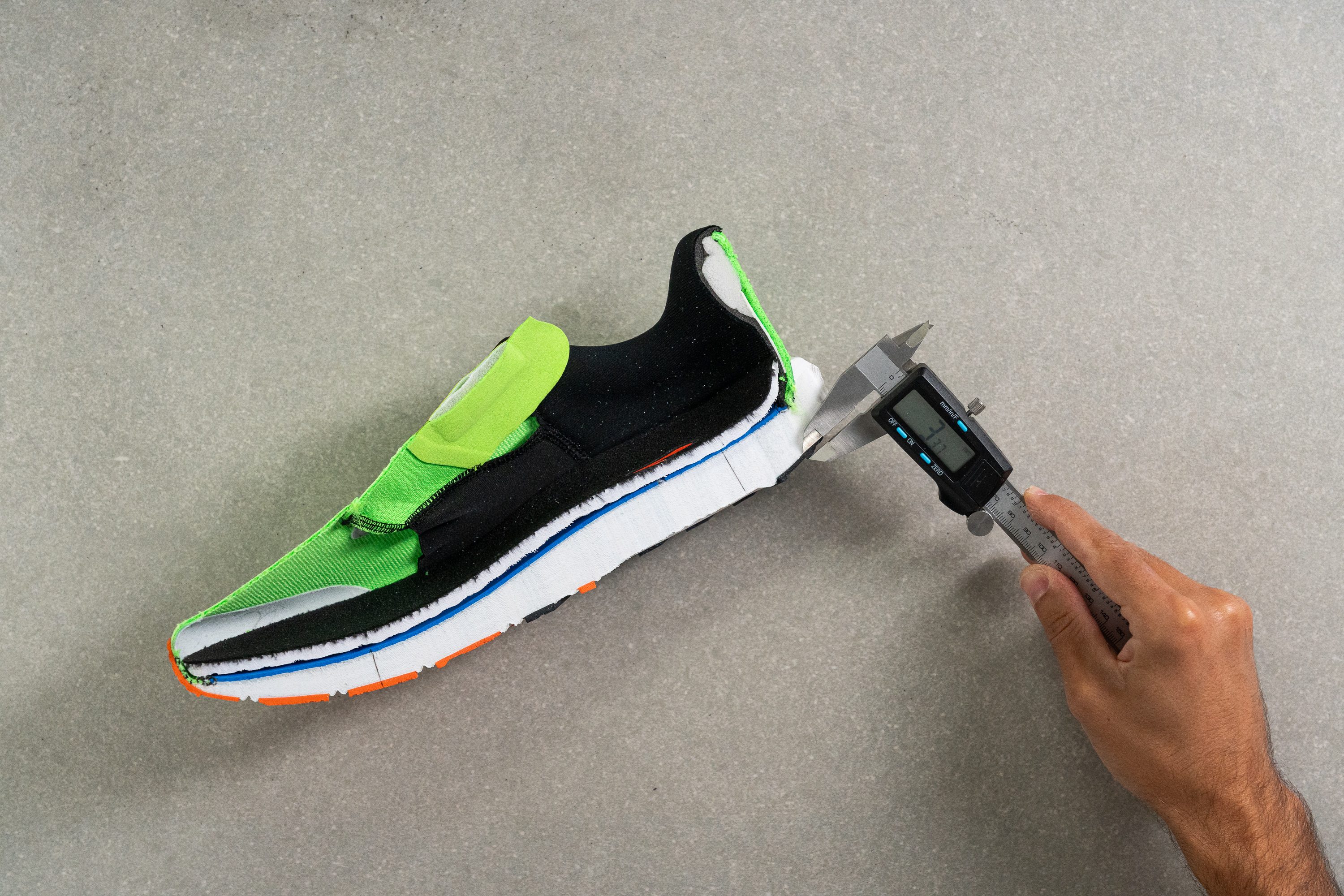
| Launch 10 | 3.4 mm |
| Average | 3.2 mm |
Misc
Insole thickness
Aiming for a boost in comfort, the insole of the Launch 10 is a little thicker than what you'll find in most shoes. It measures 5.8 mm, giving that extra cushiony feel.
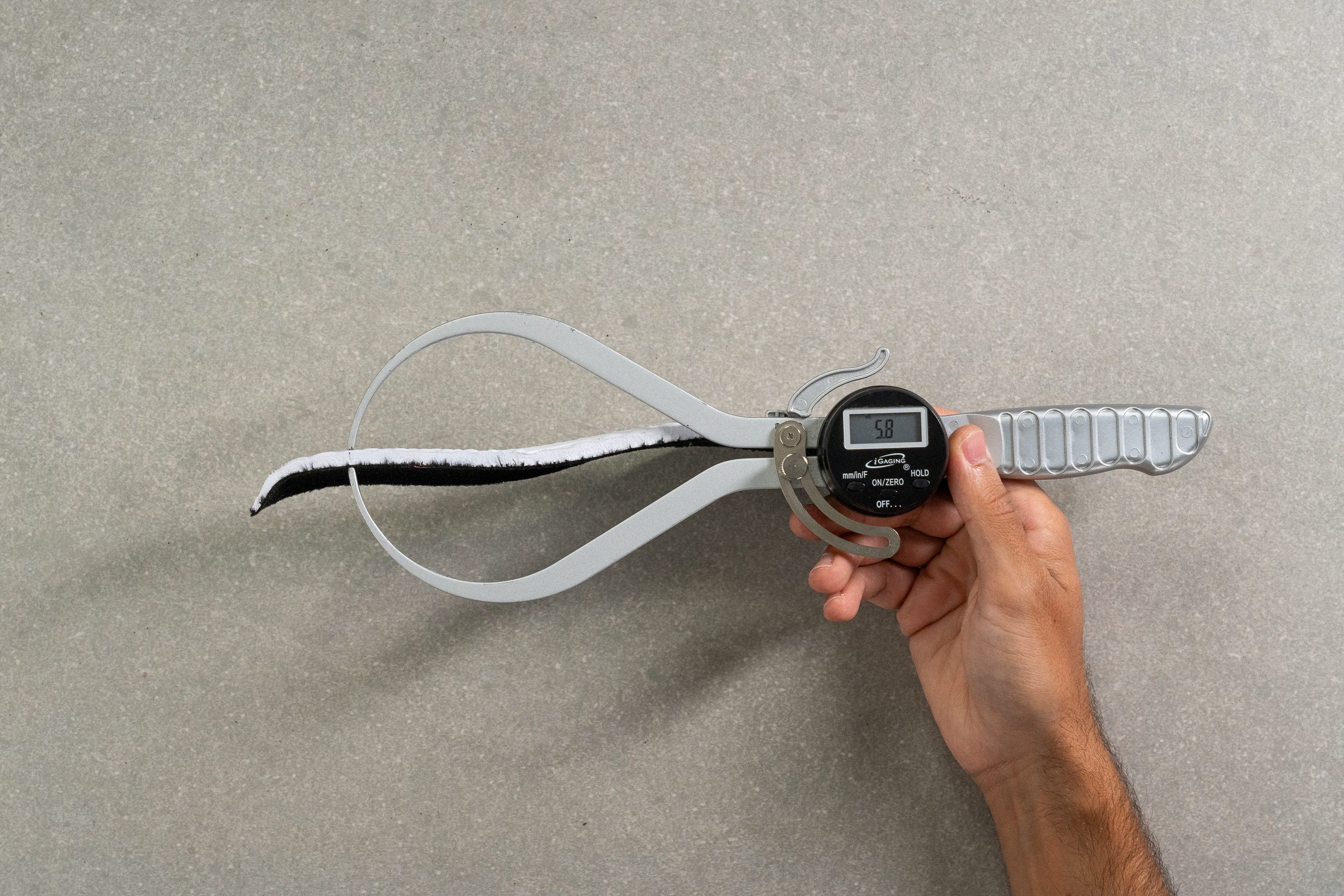
| Launch 10 | 5.8 mm |
| Average | 4.5 mm |
Removable insole
At least, the insole is removable, so you can fit your favourite one or your own orthotics.
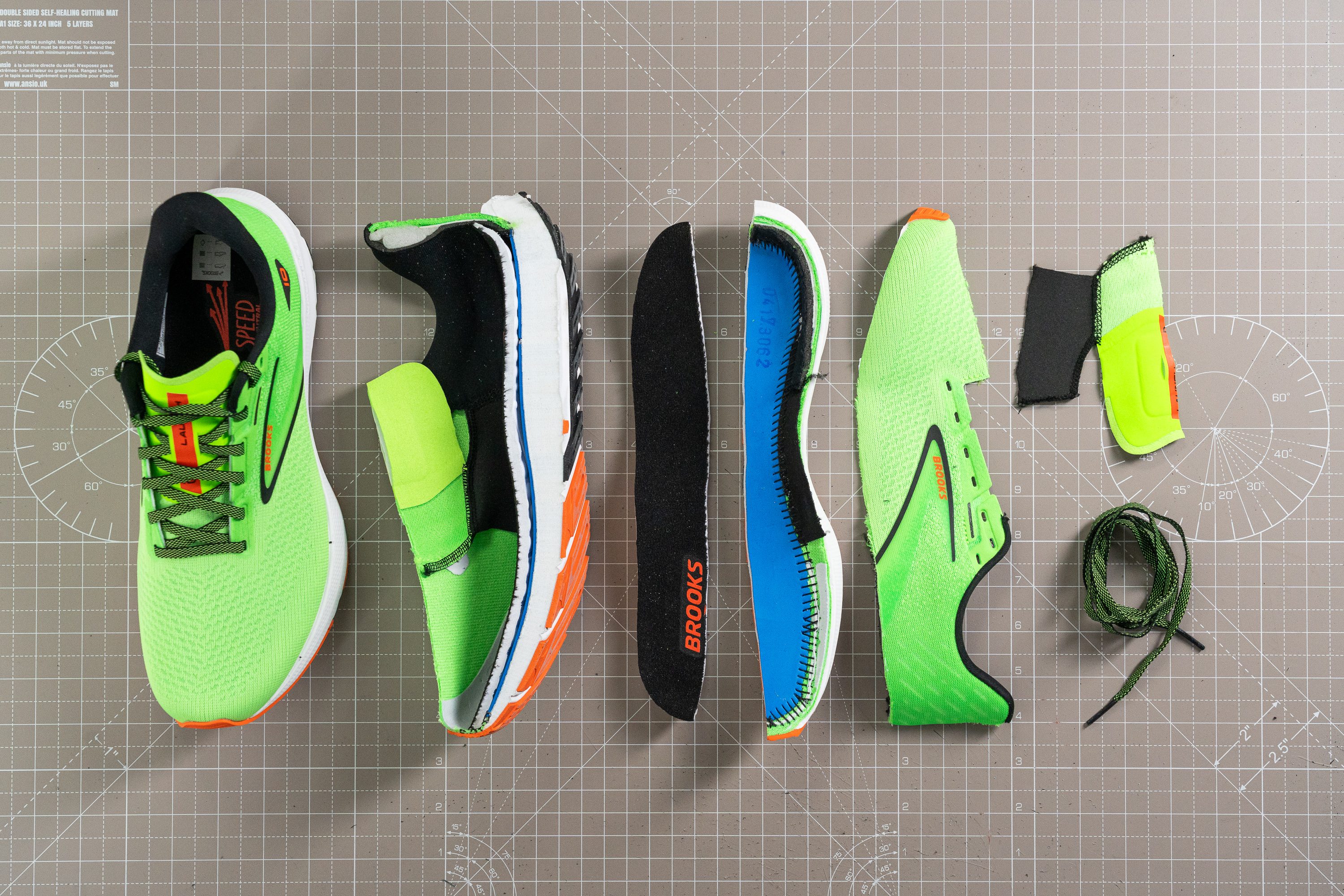
| Launch 10 | Yes |
Midsole softness in cold (%)
After letting the Launch 10 spend 20 long and boring minutes in our freezer, we checked the midsole again and found that it wasn't as plush as before. The measurement now came in at 26.5 HA, showing a noticeable change in its softness.
It's a disappointing 33.8%, but honestly, it's not the worst we've seen.
This is exactly what we'd expect from an EVA-based foam that just isn't made to deliver a top-notch performance but to keep manufacturing costs at bay.
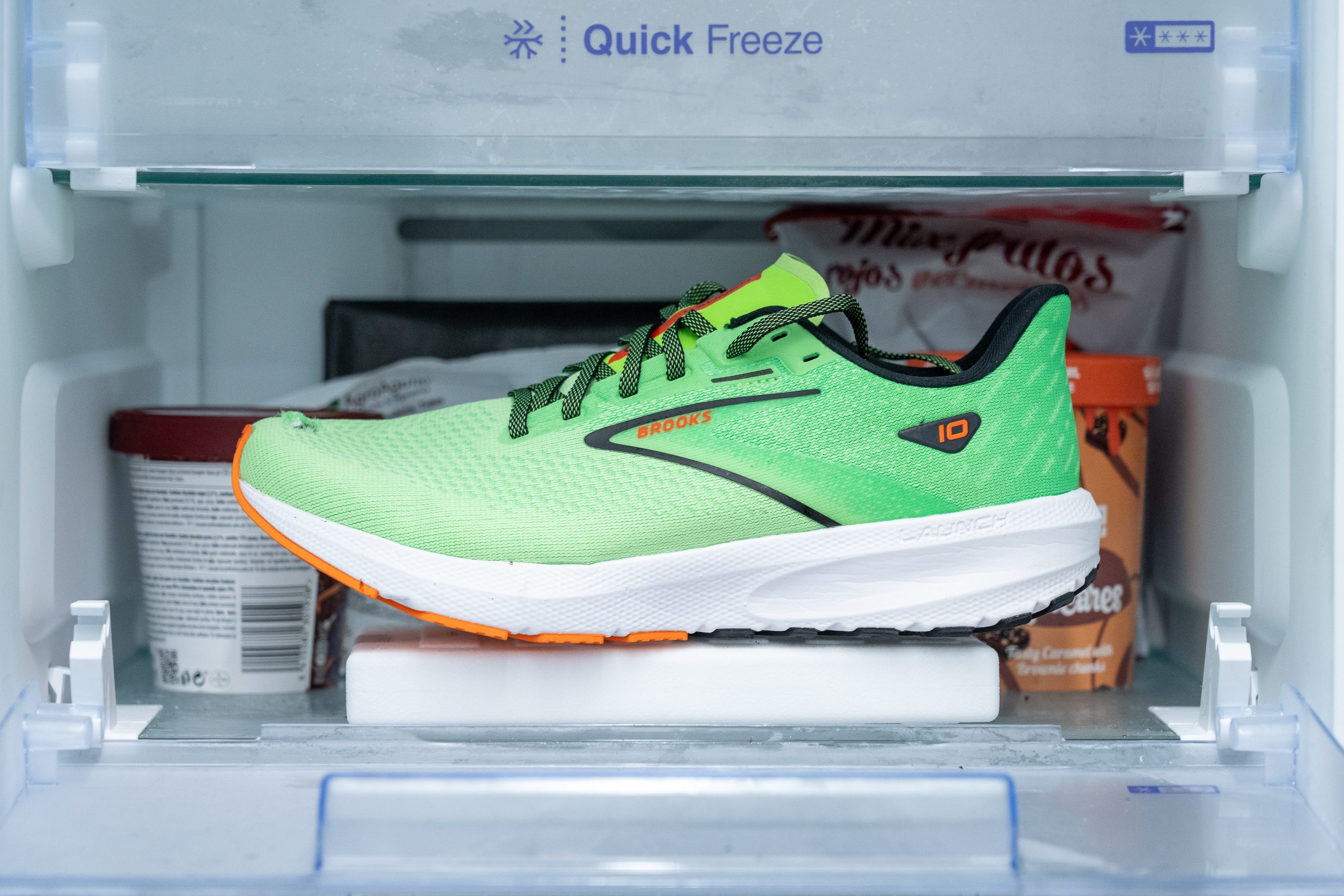
| Launch 10 | 34% |
| Average | 24% |
Reflective elements
It appears to be a recurring trend in recent running shoes—no reflective elements are included. The Launch 10 follows suit, unfortunately.
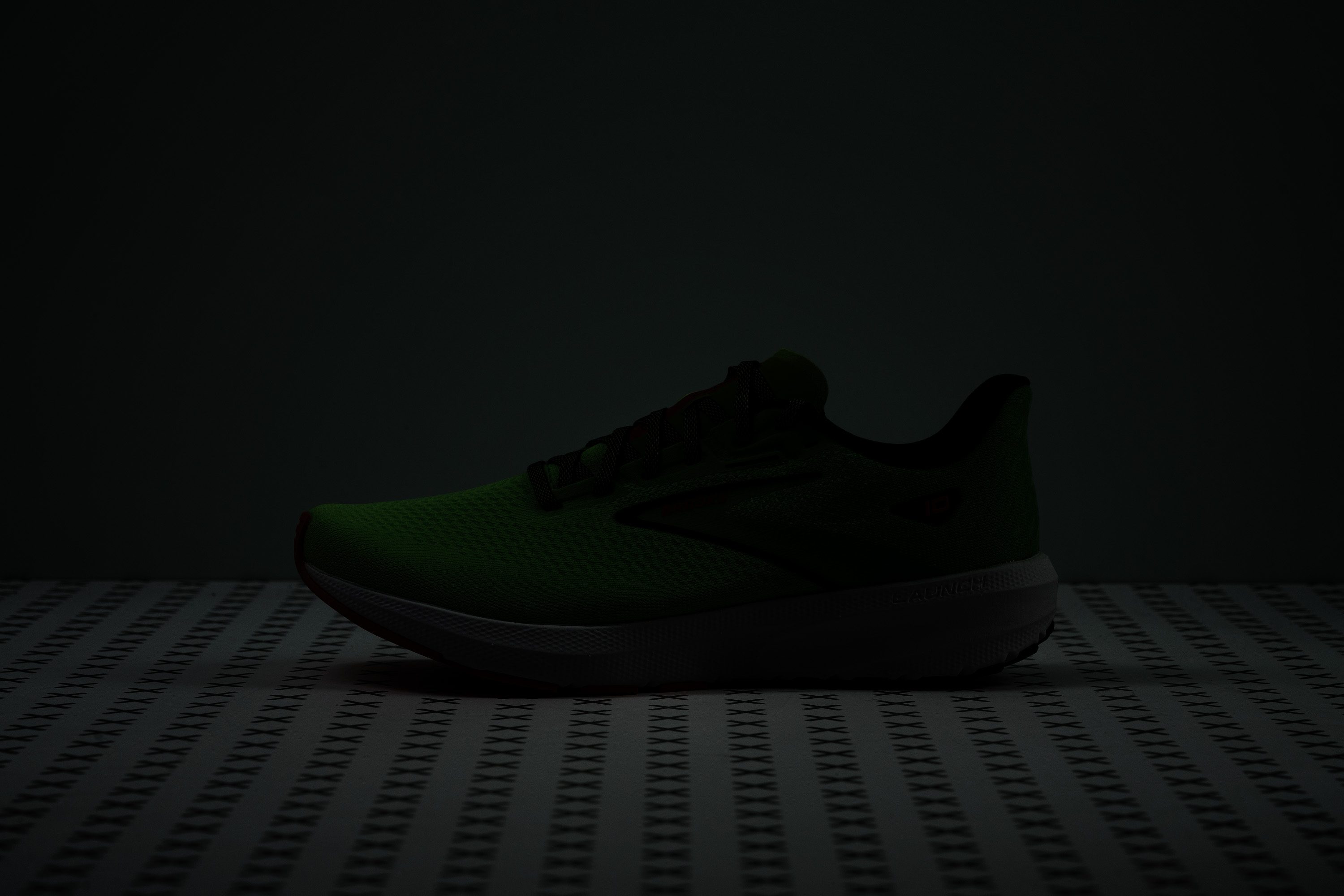
| Launch 10 | No |
Tongue padding
We continue to analyse the tongue, focusing now on its thickness. Measuring at 5.6 mm, it's quite average, seemingly striving to strike a balance between comfort and weight reduction. For this shoe, we believe it's the right approach.
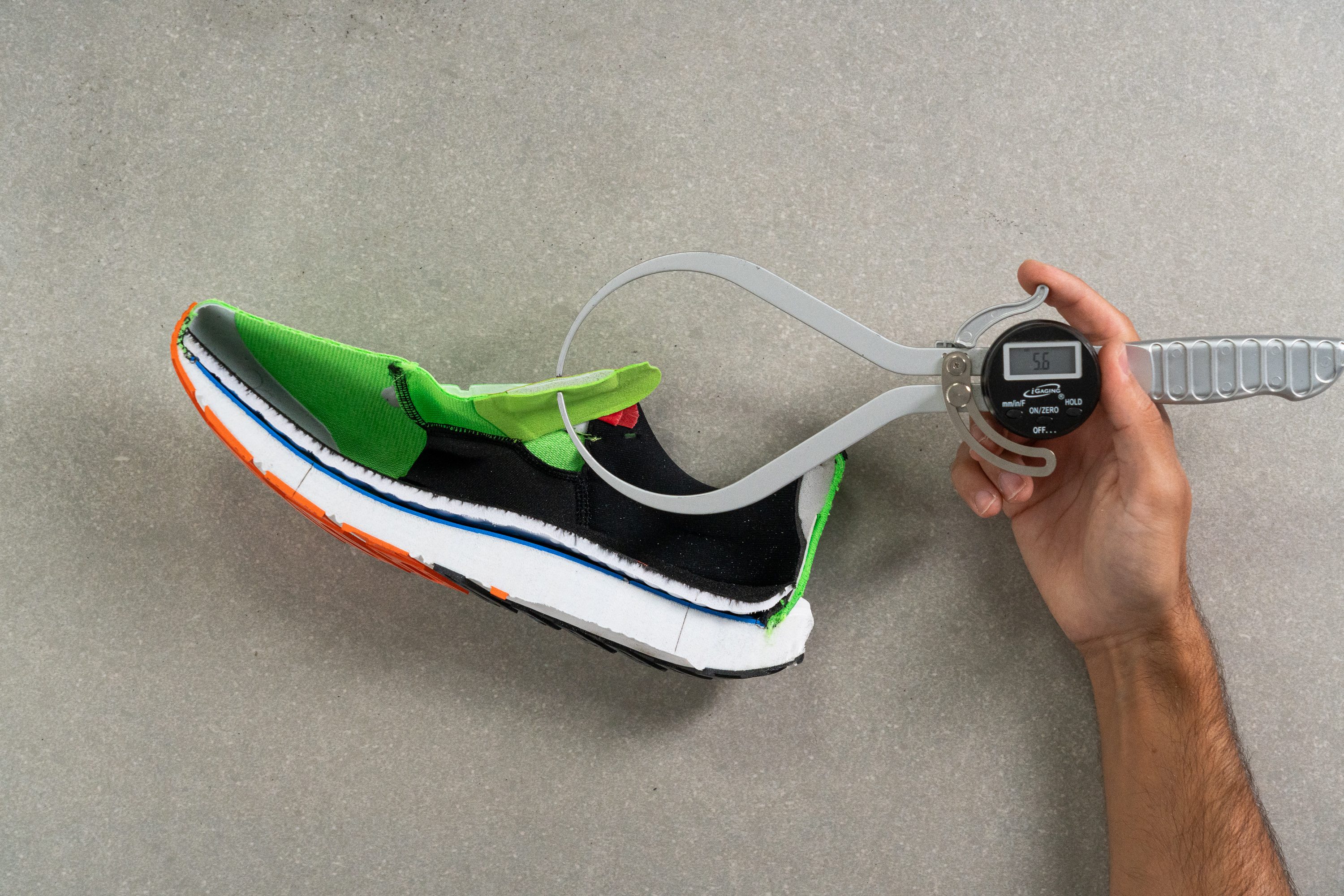
| Launch 10 | 5.6 mm |
| Average | 5.8 mm |
Tongue: gusset type
The shoe features a semi-gusseted tongue, an excellent addition that significantly enhances the lockdown.
This design prevents any unwanted tongue movement while running. Finding such an impressive feature in a £110 shoe is amazing!
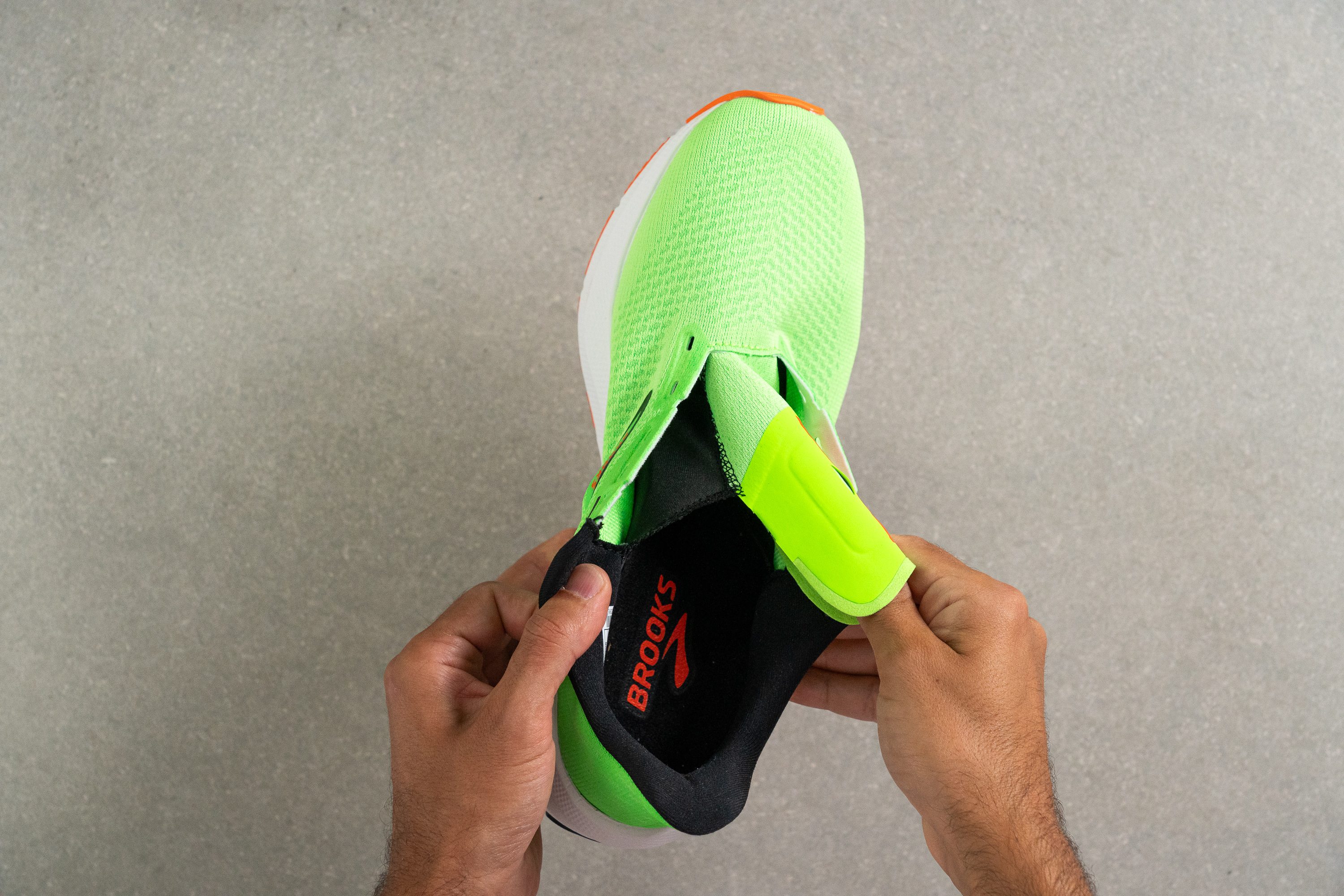
| Launch 10 | Both sides (semi) |
Heel tab
Brooks has a consistent habit of leaving out heel tabs on their shoes, and this time is no different.
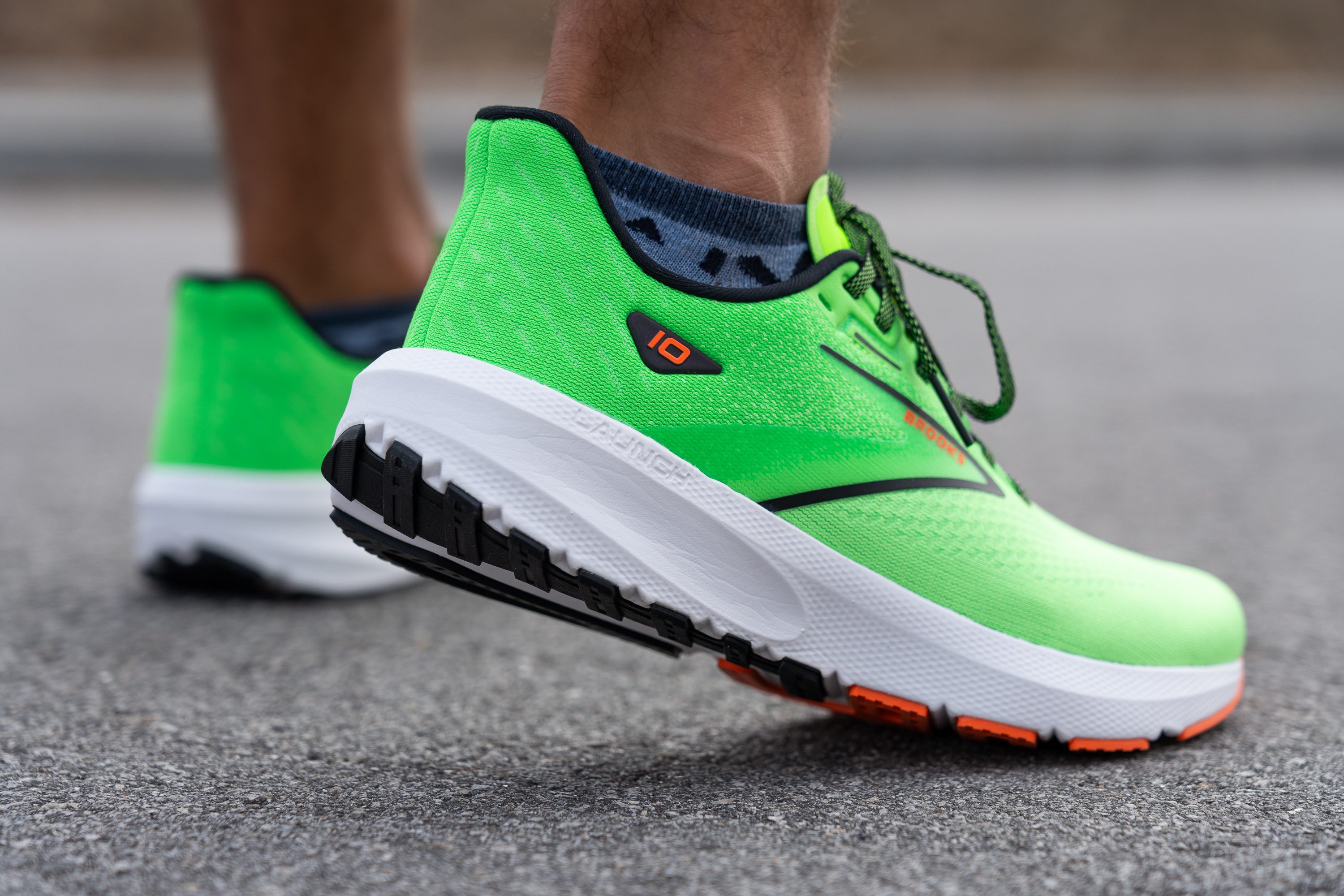
| Launch 10 | None |

